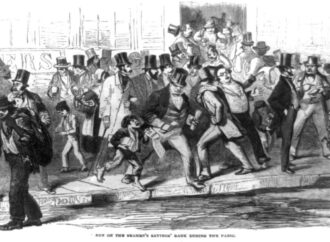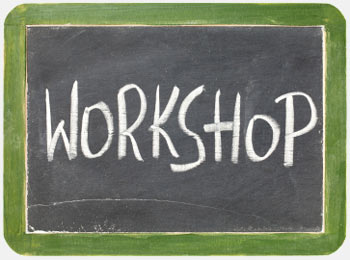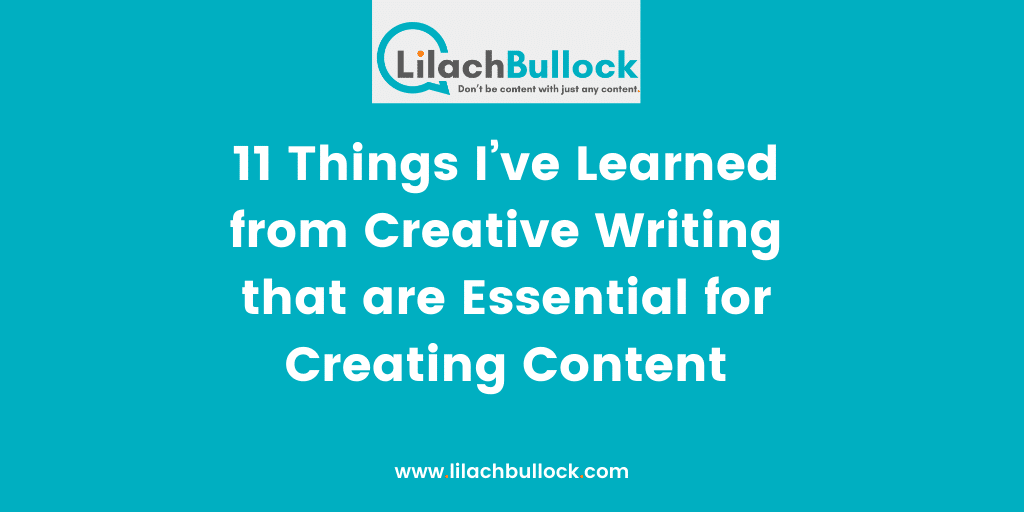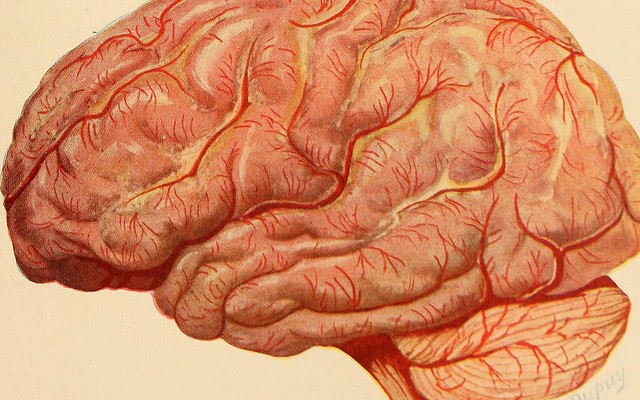I Was Homeschooled and Became a School Teacher. Here Are Honest Pros and Cons of Learning at Home.
16 things individuals can do to help bring america together, friday comic: divine providence.
- 2024-06-21T09:00:22-0500 2024-06-21T08:30:52-0500 2024-06-21T07:30:49-0500

Feeding Mind, Pursuing Truth
What four years of creative writing have taught me.
- In Education
- April 29, 2024

In 2020, I took my first college-level creative writing class. It was held on Zoom (compliments of COVID-19), and I wrote a clunky 500-word piece that was, in part, about a bug.
Now, at the end of four years of writing prose, poetry, and hymns, my writing has become (at least slightly) more sophisticated. Here are three key things I’ve learned.
1. Attentiveness Is Key
In any piece of creative writing, attentiveness is key. I had to learn this early on: One professor continually quoted poet William Carlos Williams : “No ideas but in things.” Williams believed that the best writing came from intense physical specificity.
And indeed, attentiveness elevates creative writing. It allows Ray Bradbury in Fahrenheit 451 to see Clarisse’s face as “slender and milk-white,” while “in it was a kind of gentle hunger that touched over everything with tireless curiosity.” It fosters the detail of Chaim Potok in My Name Is Asher Lev , speaking through his narrator: “I painted [the gulls] over and over again, using watercolors or washes of oils; painted their soarings into the sun, their wings in the wind, their wide diving circles over the surface of the waves.” It brings Kathleen Norris in Dakota to say of the Dakotas, “Just before dawn all is blue: I barely see the lark bunting light on a fence post.”
In each of these examples—and, indeed, in all good creative work—specificity, the product of attentiveness, breeds engagement.
And the benefits of attentiveness are not restricted to creative writing. By learning to pay attention, we are equipped to serve others better: We see needs more quickly and can respond to them well. In addition, attentiveness allows us to see the wonder of the world we inhabit. There is indeed “ beauty in the commonplace ,” though the intricacy of the plants, objects, and (most significantly) people in our world can be easy to miss.
2. Words Are Complex
We often think of words only in terms of how they are defined: just means merely , for instance, astonishment means shock , and gut-punched means to be punched in the stomach . But words, I’ve come to realize, carry more than mere definitional force.
Marilynne Robinson’s narrator in Gilead (the Rev. Ames) points out the grandeur of the simple word just . Reflecting on a description he just wrote, Ames says this:
I am thinking about the word ‘just.’ I almost wish I could have written that the sun just shone and the tree just glistened, and the water just poured out of it and the girl just laughed —when it’s used that way it does indicate a stress on the word that follows it, and also a particular pitch of the voice. People talk that way when they want to call attention to a thing existing in excess of itself, so to speak, a sort of purity and lavishness, at any rate something ordinary in kind but exceptional in degree.
And as with the effect of the word just —an effect that reaches beyond the word’s explicit definition—the sounds and cadences of our writing and speech affect the way it is perceived. I texted a friend this morning, for example, about the word “astonishment,” which—as I understand it—itself sounds astonished. The effect comes from the abrupt t sounds (which mirrors the shock of astonishment) and the gentle sh following it (which recalls the silence provoked by sudden wonder).
Similarly, the visceral word gut-punched reinforces its own meaning. The hard g , p , and d —along with the repeated accent of the word itself—gives a feeling of abruptness and strength. Gut-punched hits the reader hard—much like an actual punch in the gut. The sounds of our language contribute to their meaning.
3. Immensity Is Omnipresent
“I am the wisest man alive,” Socrates is quoted as saying (in a rephrased quote from Plato’s Apology ), “for I know one thing, and that is that I know nothing.”
At the end of a college degree, I am forced, perhaps more than ever, to face the immensity of what I don’t yet know. Five years of studying has introduced me to a wide array of books, scholars, and research topics, yet—in every book, class, and reading—there is a great measure of what I do not understand. In a sense, then, I am beginning to travel the path of every person alive: carrying the little I know and continuing to explore the world beyond.
If anything, then, four years of creative writing have taught me to see the world as large and mysterious—a mass of unknowns at which I can alternately study and marvel. I have learned so that I can learn, and—though I might exit formal schooling for a time—I am still, with all the world, a student.
Image credit: Pexels

Aletheia Hitz
Leave a Comment
Your email address will not be published. Required fields are marked with *
J.C. Joranco
Fantastic article, I had the same issue with "just", it had definitely become a crutch word that I relied on unconsciously for far too long!
This article reads like it was written by someone who ‘just’ graduated with a creative writing degree! 🤣
Dan Sullivan @Alex
I don’t think that’s fair. I graduated from college more than fifty years ago, spent most of the interim making a good living by writing, and still wish I could write a crisp, succinct essay like this one. Good for you, kid!
Dear Aletheia,
Thank you for your post. With your (or Socrates’s) thoughts (about knowing nothing), I do agree and am in accord. Or as I could say in French: “D’accord.”
All the best, Scott
Posts Carousel

- Education , Featured , MomThink
- June 21, 2024

- Entertainment

Conservatism Is About More Than Economics
- Culture , Economics , Featured
- June 20, 2024

The Pope’s Little Miracle of Laughter
- Culture , Religion

The Extraordinary Joys of Ordinary Family Life
- Culture , Family , MomThink
- June 19, 2024

Most Read from past 24 hours
Most Read from past 7 days
Most Read from past 30 days
Friday Comic: Freedom?
- June 14, 2024
Most Read of All Time
How Music Training Speeds Up Brain Development In Children
- August 29, 2016
Reading to Your Child: This is why it's so important
- May 9, 2016
Special Interests Could Be Delaying a COVID-19 Vaccine
- June 17, 2020
Is Natural Medicine Fake? Is Conventional Medicine Evil? It’s Not So Simple.
- Science , Featured , MomThink
- June 18, 2024
Something Rotten in Denmark: Israel, ‘Hamlet,’ and the Current Crisis
- Culture , Featured , International , Literature
- June 4, 2024
A Fond Farewell From Annie
- From the Editorial Board
- October 24, 2022
The Tragic Decline of Music Literacy (and Quality)
- August 16, 2018
Yellowstone: The Hidden Propaganda in Television and Movies
- February 23, 2023
Latest Posts

Frequent Contributors

Kurt Mahlburg
Contributor.

Walker Larson

Cadence McManimon

Heather Carson

Adam De Gree

Rebekah Bills

Nate Rudquist

Annie Scaife

Simon Maass
About intellectual takeout.
We provide a platform for rational discourse on all aspects of culture, inspiring action that leads to the restoration of a healthy and vibrant America.
Get In Touch With Us
Stay in the know.
Sign up for our Daily Digest email newsletter to receive intellectually engaging content and updates from our organization straight to your inbox.
Contact Info
Physical address.
8011 34TH Ave S Ste C-26 Bloomington, MN 55425
Mailing Address
PO Box 1244 Minnetonka, MN 55345
(612) 440-0205


What Is Creative Writing? (Ultimate Guide + 20 Examples)
Creative writing begins with a blank page and the courage to fill it with the stories only you can tell.
I face this intimidating blank page daily–and I have for the better part of 20+ years.
In this guide, you’ll learn all the ins and outs of creative writing with tons of examples.
What Is Creative Writing (Long Description)?
Creative Writing is the art of using words to express ideas and emotions in imaginative ways. It encompasses various forms including novels, poetry, and plays, focusing on narrative craft, character development, and the use of literary tropes.

Table of Contents
Let’s expand on that definition a bit.
Creative writing is an art form that transcends traditional literature boundaries.
It includes professional, journalistic, academic, and technical writing. This type of writing emphasizes narrative craft, character development, and literary tropes. It also explores poetry and poetics traditions.
In essence, creative writing lets you express ideas and emotions uniquely and imaginatively.
It’s about the freedom to invent worlds, characters, and stories. These creations evoke a spectrum of emotions in readers.
Creative writing covers fiction, poetry, and everything in between.
It allows writers to express inner thoughts and feelings. Often, it reflects human experiences through a fabricated lens.
Types of Creative Writing
There are many types of creative writing that we need to explain.
Some of the most common types:
- Short stories
- Screenplays
- Flash fiction
- Creative Nonfiction
Short Stories (The Brief Escape)
Short stories are like narrative treasures.
They are compact but impactful, telling a full story within a limited word count. These tales often focus on a single character or a crucial moment.
Short stories are known for their brevity.
They deliver emotion and insight in a concise yet powerful package. This format is ideal for exploring diverse genres, themes, and characters. It leaves a lasting impression on readers.
Example: Emma discovers an old photo of her smiling grandmother. It’s a rarity. Through flashbacks, Emma learns about her grandmother’s wartime love story. She comes to understand her grandmother’s resilience and the value of joy.
Novels (The Long Journey)
Novels are extensive explorations of character, plot, and setting.
They span thousands of words, giving writers the space to create entire worlds. Novels can weave complex stories across various themes and timelines.
The length of a novel allows for deep narrative and character development.
Readers get an immersive experience.
Example: Across the Divide tells of two siblings separated in childhood. They grow up in different cultures. Their reunion highlights the strength of family bonds, despite distance and differences.
Poetry (The Soul’s Language)
Poetry expresses ideas and emotions through rhythm, sound, and word beauty.
It distills emotions and thoughts into verses. Poetry often uses metaphors, similes, and figurative language to reach the reader’s heart and mind.
Poetry ranges from structured forms, like sonnets, to free verse.
The latter breaks away from traditional formats for more expressive thought.
Example: Whispers of Dawn is a poem collection capturing morning’s quiet moments. “First Light” personifies dawn as a painter. It brings colors of hope and renewal to the world.
Plays (The Dramatic Dialogue)
Plays are meant for performance. They bring characters and conflicts to life through dialogue and action.
This format uniquely explores human relationships and societal issues.
Playwrights face the challenge of conveying setting, emotion, and plot through dialogue and directions.
Example: Echoes of Tomorrow is set in a dystopian future. Memories can be bought and sold. It follows siblings on a quest to retrieve their stolen memories. They learn the cost of living in a world where the past has a price.
Screenplays (Cinema’s Blueprint)
Screenplays outline narratives for films and TV shows.
They require an understanding of visual storytelling, pacing, and dialogue. Screenplays must fit film production constraints.
Example: The Last Light is a screenplay for a sci-fi film. Humanity’s survivors on a dying Earth seek a new planet. The story focuses on spacecraft Argo’s crew as they face mission challenges and internal dynamics.
Memoirs (The Personal Journey)
Memoirs provide insight into an author’s life, focusing on personal experiences and emotional journeys.
They differ from autobiographies by concentrating on specific themes or events.
Memoirs invite readers into the author’s world.
They share lessons learned and hardships overcome.
Example: Under the Mango Tree is a memoir by Maria Gomez. It shares her childhood memories in rural Colombia. The mango tree in their yard symbolizes home, growth, and nostalgia. Maria reflects on her journey to a new life in America.
Flash Fiction (The Quick Twist)
Flash fiction tells stories in under 1,000 words.
It’s about crafting compelling narratives concisely. Each word in flash fiction must count, often leading to a twist.
This format captures life’s vivid moments, delivering quick, impactful insights.
Example: The Last Message features an astronaut’s final Earth message as her spacecraft drifts away. In 500 words, it explores isolation, hope, and the desire to connect against all odds.
Creative Nonfiction (The Factual Tale)
Creative nonfiction combines factual accuracy with creative storytelling.
This genre covers real events, people, and places with a twist. It uses descriptive language and narrative arcs to make true stories engaging.
Creative nonfiction includes biographies, essays, and travelogues.
Example: Echoes of Everest follows the author’s Mount Everest climb. It mixes factual details with personal reflections and the history of past climbers. The narrative captures the climb’s beauty and challenges, offering an immersive experience.
Fantasy (The World Beyond)
Fantasy transports readers to magical and mythical worlds.
It explores themes like good vs. evil and heroism in unreal settings. Fantasy requires careful world-building to create believable yet fantastic realms.
Example: The Crystal of Azmar tells of a young girl destined to save her world from darkness. She learns she’s the last sorceress in a forgotten lineage. Her journey involves mastering powers, forming alliances, and uncovering ancient kingdom myths.
Science Fiction (The Future Imagined)
Science fiction delves into futuristic and scientific themes.
It questions the impact of advancements on society and individuals.
Science fiction ranges from speculative to hard sci-fi, focusing on plausible futures.
Example: When the Stars Whisper is set in a future where humanity communicates with distant galaxies. It centers on a scientist who finds an alien message. This discovery prompts a deep look at humanity’s universe role and interstellar communication.
Watch this great video that explores the question, “What is creative writing?” and “How to get started?”:
What Are the 5 Cs of Creative Writing?
The 5 Cs of creative writing are fundamental pillars.
They guide writers to produce compelling and impactful work. These principles—Clarity, Coherence, Conciseness, Creativity, and Consistency—help craft stories that engage and entertain.
They also resonate deeply with readers. Let’s explore each of these critical components.
Clarity makes your writing understandable and accessible.
It involves choosing the right words and constructing clear sentences. Your narrative should be easy to follow.
In creative writing, clarity means conveying complex ideas in a digestible and enjoyable way.
Coherence ensures your writing flows logically.
It’s crucial for maintaining the reader’s interest. Characters should develop believably, and plots should progress logically. This makes the narrative feel cohesive.
Conciseness
Conciseness is about expressing ideas succinctly.
It’s being economical with words and avoiding redundancy. This principle helps maintain pace and tension, engaging readers throughout the story.
Creativity is the heart of creative writing.
It allows writers to invent new worlds and create memorable characters. Creativity involves originality and imagination. It’s seeing the world in unique ways and sharing that vision.
Consistency
Consistency maintains a uniform tone, style, and voice.
It means being faithful to the world you’ve created. Characters should act true to their development. This builds trust with readers, making your story immersive and believable.
Is Creative Writing Easy?
Creative writing is both rewarding and challenging.
Crafting stories from your imagination involves more than just words on a page. It requires discipline and a deep understanding of language and narrative structure.
Exploring complex characters and themes is also key.
Refining and revising your work is crucial for developing your voice.
The ease of creative writing varies. Some find the freedom of expression liberating.
Others struggle with writer’s block or plot development challenges. However, practice and feedback make creative writing more fulfilling.
What Does a Creative Writer Do?
A creative writer weaves narratives that entertain, enlighten, and inspire.
Writers explore both the world they create and the emotions they wish to evoke. Their tasks are diverse, involving more than just writing.
Creative writers develop ideas, research, and plan their stories.
They create characters and outline plots with attention to detail. Drafting and revising their work is a significant part of their process. They strive for the 5 Cs of compelling writing.
Writers engage with the literary community, seeking feedback and participating in workshops.
They may navigate the publishing world with agents and editors.
Creative writers are storytellers, craftsmen, and artists. They bring narratives to life, enriching our lives and expanding our imaginations.
How to Get Started With Creative Writing?
Embarking on a creative writing journey can feel like standing at the edge of a vast and mysterious forest.
The path is not always clear, but the adventure is calling.
Here’s how to take your first steps into the world of creative writing:
- Find a time of day when your mind is most alert and creative.
- Create a comfortable writing space free from distractions.
- Use prompts to spark your imagination. They can be as simple as a word, a phrase, or an image.
- Try writing for 15-20 minutes on a prompt without editing yourself. Let the ideas flow freely.
- Reading is fuel for your writing. Explore various genres and styles.
- Pay attention to how your favorite authors construct their sentences, develop characters, and build their worlds.
- Don’t pressure yourself to write a novel right away. Begin with short stories or poems.
- Small projects can help you hone your skills and boost your confidence.
- Look for writing groups in your area or online. These communities offer support, feedback, and motivation.
- Participating in workshops or classes can also provide valuable insights into your writing.
- Understand that your first draft is just the beginning. Revising your work is where the real magic happens.
- Be open to feedback and willing to rework your pieces.
- Carry a notebook or digital recorder to jot down ideas, observations, and snippets of conversations.
- These notes can be gold mines for future writing projects.
Final Thoughts: What Is Creative Writing?
Creative writing is an invitation to explore the unknown, to give voice to the silenced, and to celebrate the human spirit in all its forms.
Check out these creative writing tools (that I highly recommend):
| Recommended Tools | Learn More |
|---|---|
| Jasper AI | |
| Show Not Tell GPT | |
| Dragon Professional Speech Dictation and Voice Recognition | |
| Surface Laptop | |
| Bluehost | |
| Sqribble (eBook maker) |
Read This Next:
- What Is a Prompt in Writing? (Ultimate Guide + 200 Examples)
- What Is A Personal Account In Writing? (47 Examples)
- How To Write A Fantasy Short Story (Ultimate Guide + Examples)
- How To Write A Fantasy Romance Novel [21 Tips + Examples)

10 Essential Lessons You’ll Learn in a Creative Writing Workshop
by Melissa Donovan | Jul 11, 2023 | Creative Writing | 9 comments

What can you learn in a creative writing workshop?
When I look back over all my years of formal education, from preschool through college, only a few classes stand out as truly educational in a life-changing way.
In sixth grade, we did a section on space, which fascinated me. I retained a lot of what I learned. Later, I took astronomy and learned even more about the universe. A class on women writers exposed me to a whole world of literature I didn’t know existed. And two writing workshops (poetry and creative writing) put me on the path to becoming a professional writer.
The main difference between a regular class and a workshop is that a workshop is interactive. You work together with your fellow students, critiquing each other’s work, asking questions, and exchanging insights. Whatever you can learn from a single instructor is multiplied by all the knowledge and wisdom you gain by sharing ideas with a roomful of your peers.
What You Can Learn from a Creative Writing Workshop
I only took one creative writing workshop, and I’m sure they are not all equal. At an accredited school, you can usually sit in on the first couple of sessions to see if a class or workshop is right for you before you commit. If you find a good workshop, you’ll reap the benefits:
1. Discover yourself and your path. One day, while sitting in creative writing workshop, I was overcome by the strangest sensation. The best way I can describe it is that I felt like I was exactly where I was supposed to be. It was the moment I knew without a doubt that I would be a writer.
2. Find out what your writing strengths are. The best part about receiving critiques from your peers is that they tell you what you’re doing right, which is reassuring. When you know that your writing skills have a solid foundation, it’s easier to accept that you still have work to do.
3. Accept the weaknesses in your writing. No matter how good your writing is now, there are things you can do to improve it. When ten of your classmates agree that certain elements in your prose need touching up or that you need to hit the grammar books, all you can do is accept it and dig your heels in.
4. Learn to handle critiques of your work. The first few critiques might be a bit rough, but once you see how all the suggestions make your writing better, you’ll start looking forward to them. You’ll learn how to separate yourself from your work, and you’ll be able to not only handle but actually embrace (and look forward to) critiques. This will also prepare you for real-world critics and their reviews.
5. Help others improve their work. When other writers put your suggestions into action or express appreciation for your recommendations and then tell you that your feedback helped them improve their writing, it feels good, especially when the arrangement is reciprocal.
6. Meet people who share your passion. There’s nothing like sitting in a room surrounded by people who are just as excited about writing as you are. It’s not only inspiring, it’s comforting. Plus, it’s a great opportunity to meet like-minded people, some of whom may become lifelong friends, writing partners, or your future writing group.
7. Improve your writing. This, of course, is the main reason most people take a creative writing workshop. The ultimate goal is to become a better writer , and a workshop will definitely do the trick. You’ll also put a lot more effort into everything you write because you know it will be scrutinized, and this builds excellent writing habits .
8. Adopt new writing techniques. Between the instructor and your peers, you’ll discover all kinds of interesting new writing tools and techniques, often simply through the course of discussion as well as through observing everyone’s work.
9. Get access to a mentor. The person running the workshop should be knowledgeable and experienced in the world of writing. Maybe the instructor is a published author, or maybe it’s someone who’s worked as an agent, editor, or publisher. This access to a mentor is priceless. Take advantage of it!
10. Gain experience and get a lot of creative writing practice. This is one of the most valuable benefits of a creative writing workshop. When writers work on their own, they tend to procrastinate, get distracted, and generally don’t finish most of the projects they start. But in a workshop, you’re forced to get it done. This gives you lots of great experience and practice, and it also builds good writing habits.
Thinking About Taking a Creative Writing Workshop?
I definitely recommend taking a creative writing workshop if you can find a good one that suits your schedule, budget, and writing needs. If you’ve already taken a creative writing workshop or class, share your experiences by leaving a comment. Did you learn or gain anything? Would you do it again?

You have spoken along these lines before, Melissa, and this entry is, as all your posts, fascinating and carries a great deal of sense. However, and I know I am repeating myself, I am quite unable to allow others to trample over my work, however poor it is and however noble their (expressed) motives.
I cannot help but think of the vast number of ‘real’ writers, men and women who would not have entertained the thought that writing could be learned, like arithmetic, in a classroom.
I am a poor writer and have come to accept the fact I shall always be a poor writer; it is my belief that some things – like arithmetic – can be ‘brought to heel’ by sheer hatd work, while others, like music, painting and writing, will remain ever beyond the reach of some.
Further, I have seen very promising young tennis players taken up by organisations such as the LTA and coached, every shred of flair and originality brutally ‘ironed out’ of them, and my fear is that, for many of us, attending a writer’s workshop would be a similarly dulling experience.
I also realise, however, that there are those of a temperament to survive – and evn thrive in such conditions. Sadly, I am not one of them.
Again, my thanks for a fascinating and informative blog and may it go on to even greater success, but I think you should make it clear that not everyone who has pretensions of being a writer will see their dream come true.
I believe anyone can become a writer. It starts with believing in yourself. I would add that successful authors demonstrate a range of writing skills. Even a “poor writer” (which you are not) can eke out a career in writing. I’ve seen it done. The only way to be sure you will never succeed is to never try.
Writing can be intended for a wide audience but it’s reason for being is that the writer cannot bear not to write. Whether you are a Eudora Welty, basking in prayers se or an Ethel Jackson whose writing fills notebooks only she has seen, your work has much value
Our local university has leisure learning classes that are workshops. We not only get feedback on our work, but we also learn how to workshop a piece, looking parts of the writing process with a discerning eye. The instructors keep the focus on the work, not the author. It’s so helpful for all the reasons you mentioned, but also to learn how to look constructively at my own work before anyone else ever reads it. Being inspired by fellow writers talking about writing is my favorite part. I’m sorry that opsimath feels that way. Whose to say what’s poor writing or good writing? Of course, some is obvious, and the above comment isn’t bad writing. I found it to be well-crafted and conveyed what the author intended. Not everybody is Stephen King or F.Scott Fitzgerald, and there are some who would argue even they aren’t good writers. I had the fear that I would lose myself in critique, but even in that it’s a good exercise. One of my best lessons is that no matter what others said, it’s still my writing. I can choose to take their advice or not. Workshops are only helpful when the focus is on the work, though. It’s a criitique, not a criticism. I’ve been in bad ones and they can hurt more than help. I got out of them quick.
Yes! Everything you said is spot-on. Your experiences in workshop give all of us reason to feel optimistic about finding good writing workshops and the benefits that we’ll gain from them. Thanks so much for sharing your experience. I hope it inspires others to take the plunge and try workshopping for themselves.
You have talked thusly some time recently, Melissa, and this section is, as every one of your posts, interesting and conveys a lot of sense. On the other hand, and I know I am rehashing myself, I am very not able to permit others to trample over my work, however poor it is and however honorable their (communicated) thought processes.
I really want to think about the incomprehensible number of “genuine” essayists, men and ladies who might not have entertained the prospect that written work could be learned, similar to math, in a classroom.
I am a poor essayist and now acknowledge the actuality I should dependably be a poor author; it is my conviction that a few things – like math – can be ‘conveyed to heel’ by sheer hatd work, while others, similar to music, painting and composing, will remain ever past the compass of some.
Further, I have seen extremely encouraging youthful tennis players taken up by associations, for example, the LTA and instructed, each shred of energy and innovation mercilessly ‘resolved’ of them, and my trepidation is that, for a significant number of us, going to an author’s workshop would be an also dulling knowle
Hi Shamit. Receiving feedback and critiques is not the same as people trampling all over your work. A good critique is designed to make your writing better. If you want to be a better writer, you can certainly work toward that. It’s your choice. There are people who have a natural talent for writing. However, great writing requires a lot of different skills (grammar, storytelling, word-craft, etc.). Even the most talented writers will find some area of the craft where they need to learn skills they don’t possess. The idea that writing can’t be learned is simply not true, as evidenced by thousands upon thousands of people who worked hard to learn the craft and then became successful. The myth that talent is a requirement is an unfortunate one.
A writer is someone who writes. However, the object of writing is not necessarily to get published or make a living by writing. Read, for example, the notebooks of Thomas Edison. One of the best writers I knew was my grandmother, who maintained weekly correspondence with seven high school girlfriends for over 50 years.
That’s true, Ann. People write for many reasons and not only for professional purposes.
Trackbacks/Pingbacks
- 10 Essential Lessons You'll Learn in a Creative Writing Workshop | Creative Writing | Writing Forward « Project Chiron - [...] via 10 Essential Lessons You'll Learn in a Creative Writing Workshop | Creative Writing | Writing Forw.... [...]
- No Wasted Ink Writer’s Links | No Wasted Ink - […] 10 Essential Lessons You’ll Learn in a Creative Writing Workshop […]
Submit a Comment Cancel reply
Your email address will not be published. Required fields are marked *
This site uses Akismet to reduce spam. Learn how your comment data is processed .

Subscribe and get The Writer’s Creed graphic e-booklet, plus a weekly digest with the latest articles on writing, as well as special offers and exclusive content.

Recent Posts
- 12 Nature-Inspired Creative Writing Prompts
- Poetry Writing Exercises to Engage the Senses
- Tips for Developing Story Writing Ideas
- Reading, Writing, and Reviewing Good Poems
- Consuming Art to Fuel Your Writing
Write on, shine on!
Pin It on Pinterest
dreaming by dusk

posts by category:
- Journaling 17
- Learning 18
8 Things I've learned about creative writing
I’ve always loved creative writing, and it wasn’t until university that I realized it was one of my passions. I can’t remember a time when I wasn’t imaginative, creative, a day dreamer.
Now, at 21 I’ve realized that my imagination is one of my biggest strengths and it would be a shame to waste it.
Last year (2018) was the year I finally started to write with determination. To craft an entire story from nothing in my free time during my studies. Looking back, it was terrible but so is every other first draft.
I’m still regretful that my studies got in the way of my craft because one day I just stopped writing. My interest in the story faded.
Then my creativity found me again at the start of 2019. I was lucky this time around because I was a part-time student towards the end of my BA studies. I had more than enough time to craft world-building, characters, plot and then to sit down and write it. I was so excited and focused. I wrote at least 2000 words a day.
By the end of May to early June, the first draft was finished. About 120k words and 300 pages. Still, poorly written as first drafts are, but it was done. I persevered, thrived and finished the project that meant the world to me. In this time I dedicated myself to my passion project, I learned so much about myself and creative writing.
If you’re an aspiring writer or if you need some perspective and advice, stay here and read the rest of this post. Here are the 8 lessons I’ve learned about creative writing!
Never edit while you write
If I had to think of a metaphor, I’d say that editing while you write is like trying to clean your bedroom and getting distracted by all the things you find in nooks and crannies. I’m sure you’ve all experienced this for yourself at some point. You go to dust a shelf and start fiddling with something on the shelf.
Editing stifles creativity and progress. I wrote the first chapter about 5 times before I moved onto the next one, and that’s because I kept editing it again and again. I wanted it to be perfect. This became a constant activity in my writing process until one day I stopped. I decided that finishing the project was more important than making it perfect.
What I started doing instead was to keep writing. If something popped into my head, an edit or a new idea, I would make a note of it and save it for later. The thoughts you have about editing your work is valuable and important. You just need to bookmark them for later stages of writing. Let your writing become a stream of consciousness if you can. Don’t think about it more than you need to.
2. It’s okay if your writing is bad at first
When you write simply to put words on paper, not all of it is going to be good. It’s not going to be poetic and prose. It’s going to be a jumbled mess of you telling the story to yourself; of the story you see in your head being transcribed onto the word document.
The style will be terrible, the chapters will be shorter, and you will make a lot of errors. You have to make the choice to accept that your writing will be terrible at first. After I finished the first draft, I looked back at it for a couple of weeks. I decided certain plot points didn’t make sense, certain characters didn’t fit well into the character group. I changed so many things around, and I imagine I will change them again when I write the third draft.
Creative writing is like any other art form. If you keep practising, you get better at it.
3. Dedication is more important than inspiration
If you wait for inspiration to strike you, you never know how long you will be waiting. It could be hours, days, weeks at a time. You cannot rely on your muse constantly during your writing process. Taking charge of it is just as important. Dedicating yourself to write is more valuable to your craft than inspiration.
One thing that has worked for me, in the past and present, is setting daily goals for my creative writing. Like writing at least 500 words a day; starting small and seeing where the momentum takes me. Or putting aside an hour each morning for creativity, whether its listening to music, outlining, or writing. Or even trying to write at least 1 chapter throughout the week.
These are all great, productive rituals that help you to focus on writing every day, even when you don’t want to and when inspiration hasn’t struck yet.
4. Stop comparing your work to others
This is something really important and I’m glad I learned it early on. In creative writing, in different genres, there will be stories that are similar to yours. In one aspect or many, it doesn’t matter. It is out of your control. What’s important to remember is that none of those other stories are written by you. Those other writers won’t think and be creative like you.
For instance, the story I’m currently writing is fantasy genre and about pirates. In the writing community on Tumblr, I became extremely unmotivated to write when I came across other young writers’ stories about pirate fantasy stories. I changed things around in my first draft but I couldn’t do that every time I came across another person’s story.
So, I changed my perspective. Now, I understand that in the pirate fantasy genre, there is a limited number of tropes. Hidden treasure, swashbuckling adventurers, magic of the sea. We’re all just taking those tropes and doing something creative with them in our own ways. Just because we’re writing in the same genre, using the same tropes, it doesn’t mean our stories will be alike. Not really. In fact, this is a good thing to know about any genre, any story.
Especially when the idea is thrown around that there aren’t any original stories anymore. We’re all just being inspired by each other and other things. And that’s not a bad thing. As long as you don’t plagiarize or rely too much on it instead of your own ideas.
5. But also make your story unique
Bring something new to your story that sets it apart from others. Like a character, a setting, a plot point. Something that makes the story ‘yours’. A while back I wrote a blog post on my favourite female authors and I wrote about how Leigh Bardugo introduces new settings and a twist on a well-known magic system in her “Grishaverse” books. Tomi Adeyemi does a similar thing in her “Legacy of Orïsha” series.
One thing I did in my pirate fantasy project that is different to other writers in the Tumblr community of writers is that in my story the ships fly in the sky, not on the sea. I also tried to make the magic system more distinct and unique because it’s been done before.
Maybe there are no more original stories but that doesn’t mean you can’t make an effort to be more creative and original when you write.
6. Your own support is the best support
You can have friends and family who encourage you to continue writing. You can have a network on social media of other writers like you who all support each other. At the end of the day, you are the most valuable support to your writing process.
You need to celebrate with yourself. You need to scold yourself when you’re being lazy. You need to remind yourself that it’s okay to take a break. You are the only one who needs to be part of the process; whom needs to be excited about your project.
7. Criticism is a chance to grow
When you give your writing to someone and expect feedback, be open to suggestion. See criticism as a means to improve your writing. It isn’t a rejection of your writing or your desire to be a writer when someone gives you criticism on your writing.
You can be bitter and defeated or you can take it as an opportunity to learn about what you did wrong and what you can do better next time. Also understand that you’re story won’t be for everyone, so be careful about who you show it to for genuine feedback. Someone who only reads non-fiction won’t know what to say about fiction or fantasy.
This is especially important as a student. I took a creative writing course during my studies, and while I wanted to sprinkle in fantasy into everything I wrote, I could tell that the markers weren’t really interested in reading fantasy. The feedback I got wasn’t really helpful because of it.
What you can do instead is build your network of writer friends and show your writing to people you know will be interested. Be selective and be smart about it, and don’t see criticism as a judgement or slur against you. Different eyes means different perspectives and responses to your writing that are different from your own.
8.Keep falling in love with your writing
Last but not least, try to find new ways to fall in love with your writing rituals, your creative process and your project. When I started my first draft, I created a music playlist. I would listen to it on my commute into the city and when I walked up to campus.
I created a visual mood board on Pinterest for the world, the characters, the ships and more. I would make little notes about characters in the story. I treated my own work like it was a published book and I was a fangirl. This was the most important thing to me, to stay motivated to finish my project to its end and to not give up halfway through.
related posts

follow me elsewhere for more content

© Dreaming By Dusk 2019-2022 - All Rights Reserved

Why learn creative writing? Truthfully, creative writing is one of the most misunderstood disciplines in the 21st century. When people think of a creative writing course, they often imagine a group of lofty, out-of-touch people who wear argyle sweater vests and have unproductive conversations about abstract concepts.
In reality, nothing could be further from the truth: the best writing classes remain engaged with the real world, and the skills gained in a creative writing course apply to nearly every facet of daily life.
If you’re wondering whether it’s worth picking up a course in fiction, nonfiction, or poetry, we have five reasons to learn creative writing. But first, let’s talk about what actually happens in a creative writing course.
The Basics of a Writing Workshop
Whether you’re enrolled in a poetry, fiction, or nonfiction writing class, you can expect the following writing process – at least in a quality writing course like the ones at Writers.com.
- Weekly prompts and writing exercises to sharpen the precision and necessity of each word you use.
- Constructive critiques from a community of writers who are each growing their writing skills alongside you.
- A creative space to explore new ideas, experiment with language, and arrange words in new and exciting ways.
- Focused writing instruction from a master of the craft.
The benefits of creative writing come from engaging with the course material, the writing prompts, and the other class members. These elements help you become a better writer, both in creative realms and in everyday life. How? No matter what form of writing, a creative writing class pushes you to connect ideas and create effective narratives using the best words – and that skill translates into real world success.
The Benefits of Creative Writing
1. why learn creative writing: improved self-expression.
Improving your writing skills leads to stronger communication. When you practice finding the right word in a story or poem, you engage the same parts of your brain that are active in everyday writing and speaking. A creative writing course subconsciously turns you into a more effective communicator.
The importance of precise language and self-advocacy translates well into both interpersonal relationships and working environments. Take it from this expert on how writing and self-advocacy results in career and leadership success.
2. Why Learn Creative Writing: Job Success
This brings us to our next point: great writing leads to job success. Of course, your boss probably isn’t expecting you to write emails in the form of a short story or a sonnet – though if they are expecting this, you have a pretty cool boss.
In reality, almost every job requires some sort of written work, whether that’s simple written communication or something more elaborate, like publishing data or marketing materials. In a creative writing class, you practice the style and grammar rules necessary for effective writing, both within the realms of literature and in career-related writing. Sharpening your writing and creativity skills might just land you your next promotion.
3. Why Learn Creative Writing: Improved Thinking Skills
Strong writing leads to strong thinking. No matter what type of writing you pursue, learning how to write is another form of learning how to think.
That might seem like a bold claim, so think about it this way. Without language, our thoughts wouldn’t have form. We might not need language to think “I’m hungry” or “I like cats,” but when it comes to more abstract concepts, language is key. How would you think about things like justice, revenge, or equality without the words to express them?
When you hone in on your ability to find choice, specific words, and when you work on the skills of effective storytelling and rhetoric , you improve your ability to think in general. Good writing yields great thinking!
4. Why Learn Creative Writing: Empathy
Reading and writing both rely on empathy, especially when it comes to being an effective workshop participant. When we read and write stories, we situate ourselves in the shoes of other people; when we read and write poetry, we let language navigate us through emotion.
The importance of creative writing relies on empathy. We practice empathy whenever we listen to another person’s life story, when someone tells us about their day, and when we sit down with a client or work partner. When we write, we practice the ability to listen as well as to speak, making us more effective communicators and more compassionate human beings.
5. Why Learn Creative Writing: It’s Fun!
In case you’re not convinced that a writing course is right for you, let’s clarify one more fact: creative writing is fun. Whether you’re in a fiction writing course, starting a memoir, crafting a poem, or writing for the silver screen, you’re creating new worlds and characters. In the sandbox of literature, you’re in control, and when you invest yourself into the craft of writing, something beautiful emerges.
The Importance of Creative Writing
Simply put, creative writing helps us preserve our humanity. What better medium to explore the human experience?
To learn creative writing, like any art form, requires compassion, contemplation, and curiosity. Writers preserve the world as they observe it in stories and poetry, and they imagine a better world by creating it in their works.
Through the decades, literature has explored society’s profound changes. Literary eons like the Naturalist movement and the Beat poets responded to the increase in Western Industrialization. Confessional poets like Virginia Woolf helped transform poetry into a medium for emotional exploration and excavation. And, genre movements like the cyberpunk writers of science fiction helped popularize the idea of an “information economy.”
Thus, the importance of creative writing lies in its ability to describe the world through an honest and unfiltered lens. Anyone who engages in creative writing, no matter the genre or style, helps us explore the human experience, share new ideas, and advocate for a better society. Whether you write your stories for yourself or share them with a wide audience, creative writing makes the world a better place.
Jobs for Creative Writers
Because creative writing isn’t a STEM discipline, many people don’t think that learning it will help their job prospects. Why learn creative writing if it doesn’t make any money?
In fact, nothing could be further from the truth. Creative writing skills are much sought after on resumes, since both creativity and the ability to write are soft skills in decline. Additionally, if you’re considering a career change—or ready to start one!—these are some popular jobs for creative writers.
- Average Starting Salary: $51,000
- Demand: High
- Skills needed: creativity, grammar, timeliness
Copywriters help companies put their branding into words. A copywriter might write emails, blogs, website content, or ad copy that encompasses the company’s voice and purpose. Copywriting requires you to write in a mix of styles and forms, flexing your writing muscles in new and exciting ways.
Grant Writer
- Average Starting Salary: $50,000
- Skills needed: storytelling, research, argumentation
Nonprofits and research facilities rely on local and national grants to fund their projects. Grant writers help secure that funding, writing engaging grants that tell the organization’s story in an engaging, tailored, and convincing way. Creative writers will enjoy the opportunity to tell a meaningful story and create positive community change through this career.
Communications/Public Relations Specialist
- Skills needed: creativity, communications, social media
A communications specialist helps drive a company’s image through various social channels. They may help create a positive narrative for their company through blogs, journalist outreach, social media, and other public-facing avenues. Much like copywriting, a PR specialist helps weave an effective story for a company.
- Average Starting Salary: $55,000
- Demand: Medium/High
- Skills needed: creativity, storytelling, organization, self-reliance
The dream job for many writers is to write and sell books. Being a novelist is an admirable career choice—and also requires the most work. Not only do you have to write your stories, but you also have to market yourself in the literary industry and maintain a social presence so that publishers and readers actually read your work. It’s a tough business, but also incredibly rewarding!
Reasons to Learn Creative Writing: Finding a Writing Community
Finally, creative writing communities make the writing struggle worth it. The relationships you foster with other creative writers can last a lifetime, as no other group of people has the same appreciation for the written word. Creative writing communities create transformative experiences and encourage growth in your writing; if there’s one reason to study creative writing craft, it’s the friendships you make in the process.
You don’t need a class to start writing, but it’s never a waste of time to learn the tools of the trade. Creative writing requires the skills that can help you in everyday life, and a creative writing course can help.
At Writers.com, we believe that creative writing can transform both individual lives and the world at large. See the importance of creative writing for yourself: check out what makes our creative writing courses different , then take a look at our upcoming course calendar today.
Sean Glatch
Would like to apply for a course to write a novel.
I’d be happy to help! Please email [email protected] with any questions, and we’ll find the right course for your writing.
[…] Sean. “Why Learn Creative Writing.” writers.com. June 7, 2020. https://writers.com/why-learn-creative-writing . Accessed November 7, […]
[…] And last of all it’s fun! I hope to live my life doing the things I love, with like-minded creative people who I love. I have many exciting things upcoming as I continue with the process of completing my first novel, Les Année Folles, such as publishing to my first magazine, journal, and working on the millions of short story ideas I have stored in my head. Stay tuned! References: Glatch, S. (2020, June 7). WHY LEARN CREATIVE WRITING? Retrieved from Writers.com: https://writers.com/why-learn-creative-writing […]
Leave a Comment Cancel Reply
Save my name, email, and website in this browser for the next time I comment.
Member-only story
3 Things I’ve Learned From Getting A Creative Writing Degree
The rumors are true…. you don’t need a degree to start a writing career. but from my perspective, it was worth it..
New Writers Welcome
I don't regret going to college for creative writing.
Here’s the thing. I understand why a lot of people say you don’t need a degree to have a…

Written by Shelby Lou
Creative writer and copywriter with topics on life-lessons, travel, health, writing tips, and more. Follow for enterainting and informative reads!
Text to speech

- Re-engineer your Business mindset for success
- Productivity tips, advice and tools
- Content marketing templates, strategies and tips
- Social Media guides, tips and tactics
- Useful tools for bloggers and businesses
- Product Reviews
- Sales tips, planning, business development & lead generation
- SEO tips, tricks and strategies
- Harness the Power of AI for Business Growth
- Work with Me
Want to get your podcast sponsored and make more $ from it? [even if it’s new or has low downloads!] Check out my free course!

Follow Lilach

11 Things I’ve Learned from Creative Writing that are Essential for Creating Content
I have been writing nonstop since I learned how. When I was eight, I wrote plays and had the neighbourhood kids perform them with me in the driveway. (“Sara, I want to play baseball.” “But you have to REHEARSE.”)
I received my undergrad degree in English, I have a Master’s degree in Creative Writing, I have taken countless workshops and completed a playwriting apprenticeship at Horizon Theatre in Atlanta, and I even teach graduate online writing courses for Southern New Hampshire University. I’m also an active author and playwright.
Writing is my life.
After I graduated from grad school, I was shocked to discover I couldn’t just publish books, write plays, and make a living. As I searched for a way to get paid for writing, it was natural to fall into digital marketing. I wrote web content, blog posts, and social media content, both as a freelancer and with marketing agencies (where I currently work).
As I continued to work in digital marketing, I discovered that I loved it. Over the years, I have realized that every day, I use so many of the things I learned in my studies of creative writing. Here are eleven creative writing rules content marketers can use as well.
Show, don’t tell.
This is one of the first things you learn in a creative writing class. Whether you’re writing poetry, plays, or fiction, it’s much more powerful to show the reader/audience an image or conversation that evokes sadness, for example, than it is to say, “this character was sad.”
Antov Checov put it this way. “Don’t tell me the moon is shining; show me the glint of light on the broken glass.”
Excellent poetry is all about imagery. Superb scripts are all about dialogue. Brilliant fiction is all about narrative. There are so many ways writers can show instead of tell:
- Use the five senses – You want to make the reader feel, taste, smell, see, or hear the scene. You want them to feel like they are there.
- Use strong verbs – A writer should use active verbs more than passive verbs. Active verbs often imply movement. They can create a complete image in a reader’s head.
- Use dialogue – Don’t tell us what another character said. Show us the exact dialogue that was spoken.
Content marketers need to follow this rule as well. When you’re providing tips on a new marketing tool, for example, it’s much more effective to provide screenshots or a video tutorial than it is to simply write a blog post telling the reader what to do.

Providing screenshots to show someone how to do something is more effective than telling them.
If you’re introducing a new product to your customers, of course it’s essential to provide images. But even if you’re writing a blog post about something more abstract, you should always offer examples, case studies, and photos that illustrate your points.
Don’t just tell readers what they need to be doing; show them how to do it.
If it’s possible to cut a word or phrase out, cut it out.
Whether you’re writing a poem, a short story, a play, or a screenplay, every word counts. You don’t want to have an excess of flowery description or filler language that doesn’t have a point. If you can retain the meaning of a piece cutting out a word or phrase, you should.
This rule applies to content as well. Whether you’re writing web content, blog posts, or text on an infographic, get to the point. People don’t have a lot of time to waste on filler words.
There are certain words you can almost always cut out: just, then, very, really, totally, completely, definitely, and certainly. These words don’t add to a sentence. You can retain the meaning without them.
Don’t use clichés.
There are a lot of fiction clichés to be avoided. “It was a dark and stormy night.” “It was raining cats and dogs.” “Her love was like a rose in bloom.” I write young adult fiction, and one of the favorite phrases for YA authors seems to be, “she let out a breath she didn’t know she was holding.” That’s overused so much, it’s become a cliché.
The world of marketing has its own clichés that should be avoided. “Content is king.” “Go above and beyond.” “It’s a paradigm shift.” Get creative. Come up with new ways to say what you want to say.
Don’t overdo exclamation points.
Exclamation points are like hammers in the writing world. They’re there to express big emotions like excitement, passion, and anger. Used sparingly, they can be effective. It’s easy for writers to overuse them, though.
Exclamation points imply you expect the reader not to know how a phrase should be read. If the writing is sharp enough, you won’t need exclamation points to emphasize words and phrases.
The same is true for any sort of content. I know it’s easy to get excited when you’re talking about something you’re passionate about. And if you’re in the marketing world, hopefully you’re passionate about it. But don’t overdo the exclamation points. They come across like you’re shouting or being abrasive.
Read writing aloud when editing.
This is essential for plays and screenplays which are full of dialogue that’s meant to be heard rather than read. But it can also be true for fiction, poetry, and non-fiction. Reading your work aloud allows you to see it in a different light. It will be much easier to catch errors, awkward phrasing, overly long sentences, or clunky writing when you read it out loud.
Whatever kind of copy you’re writing—whether it’s for a blog post, a website, an infographic—it’s helpful to read it out loud as you edit. If you’re not in a place where you can do this, you can even use a text-to-speech feature in many programs ( like Microsoft Word ) to get your computer to read it out loud.

The text-to-speech feature on Microsoft Word
Connect on an emotional level.
Maya Angelou said, “I’ve learned that people will forget what you said, people will forget what you did, but people will never forget how you made them feel.” This is as true in writing as it is in life. As writers are crafting their stories, they should make sure they give the audience a reason to care. One of the best ways to do this is to make them feel something.
It’s also possible to connect emotionally in content marketing. If you’re promoting the services of a personal injury attorney, for example, you can reach people on an emotional level telling a story about a pedestrian hit in traffic. Whatever you’re marketing, you should always ask yourself, “why should my audience care?” Make sure you can answer that question.
Understand your target audience.
No story is for everyone. Readers of Stephen King may not enjoy novels by Nora Roberts. Whatever you’re writing, you’re never going to write a story that appeals to everyone. So the best thing to do is to zero in on your target audience and write for them.
There is some debate about this in the writing world. Some independent authors who are able to publish fast say you can “ write to market ” where your number one consideration is your audience as you’re writing. In the traditional publishing world, the journey from writing a book to publishing it takes so long, by the time you’ve published it, the market has changed. So writers wishing to pursue this route are encouraged not to focus on a particular audience as they write.
At some point, though—whether it’s in the writing process, during revisions, or even when you’re marketing your book—you need to consider your audience.
Digital marketers always need to consider their target audience. But you’re never writing for everyone. Not everyone is going to be your audience, customer, or client. You need to focus on the specific target audience you are trying to market to.
One way to do this is to create a buyer persona. Get specific about who you are targeting. If you’re marketing a product to mothers of toddlers, for example, create one specific mother of a toddler you can create your content for. The more specifically you target her, the more other mothers of toddlers will be drawn to your content.
Use your unique voice.
Every story has been told. Everything’s already been done. What can a writer bring to the table that is truly new and original? They can bring all the unique experiences that have brought them to where they are by using their distinct voices.
Whatever content you’re producing, the chances are there is content out there that is like it. But no one else can be you. No one else can create content quite the same way you can. So don’t try to create content that sounds like someone else’s. It’s alright to be inspired by other content marketers, but you should always be using your unique voice.
Use the power of storytelling.
Stories are powerful. Stories are addictive. Stories connect us. There’s a reason people binge watch shows on Netflix. They get caught up in the stories.
You can use the power of storytelling for your brand. There are many ways you can do this.
You can tell a story in a blog post. Open a post with a story, tell a story in the middle when the reader’s attention may be wandering, or wrap up your post with a story.
Tell the story of your brand on your website. You can tell it on the “about us” page or in a blog post. Did you have to overcome any obstacles to get your brand where it is now? People love to hear stories of overcoming obstacles. That’s one of the essential elements to a story.
Tell a story in video or social media posts. Tell a story in images. Tell a story in Tweets.
Have your customers or clients tell their stories in testimonials or reviews. You can even have them make video testimonials.
Allow yourself to have bad first drafts.
Sometimes a writer needs to go through ten bad ideas before she can get to that one good one. Sometimes you need to get your ideas out before you can fix them in revisions. It’s a lot easier to revise a bad first draft than no draft at all.
This is also true of content writing. Whether you’re writing a blog post, web content, a headline, or even a social media post, don’t just go with the first thing you write. Write down all your ideas, even the bad ones. Eventually, you will find the best version of what you want to say.
Understand the rules so you can break them when necessary.
Like any art form, the rules of creative writing are meant to be broken. I know I have broken most of the rules on this list at some point. I broke some of them in this post even. Sometimes you need to break a rule to be effective.
You can break the rules you need to, though, when you understand the rules you are breaking. Just like abstract art means more when it’s painted by an artist who has painted works of realism, poems can have more meaning when they don’t follow the rules of punctuation or capitalization, for example.
There are rules associated with content marketing. But you’re probably not going to follow each rule every time you create a piece of content. If you understand which rules you are breaking, however, it will make it more effective.
There are many more rules of creative writing that can be used in content marketing. As I continue to create content, I discover more and more connections between these two worlds every day. If you didn’t study marketing, have you found any connections between what you studied and the work you’re now doing? Tell us about it in the comments.
Sara Crawford is a digital content strategist for WT Digital Agency and an author from Atlanta, Georgia. She has written novels, produced her own plays, and performed as a singer/songwriter. She is passionate about the act of creation, and she adores the written word.

In this post:

Listen to the podcast today!


About Lilach Bullock
Hi, I’m Lilach, a serial entrepreneur! I’ve spent the last 2 decades starting, building, running, and selling businesses in a range of niches. I’ve also used all that knowledge to help hundreds of business owners level up and scale their businesses beyond their beliefs and expectations.
I’ve written content for authority publications like Forbes, Huffington Post, Inc, Twitter, Social Media Examiner and 100’s other publications and my proudest achievement, won a Global Women Champions Award for outstanding contributions and leadership in business.
My biggest passion is sharing knowledge and actionable information with other business owners. I created this website to share my favorite tools, resources, events, tips, and tricks with entrepreneurs, solopreneurs, small business owners, and startups. Digital marketing knowledge should be accessible to all, so browse through and feel free to get in touch if you can’t find what you’re looking for!

AI and Entrepreneurship Dance Off Winning the Marketing Marathon

Bob Burg Spills the Beans: Success, Sales, and the Magic of Giving More Than You Get

Semrush’s Erich Casagrande Reveals His Top SEO Strategies for Dominating Google

StatSocial’s Andrea Rosi Reveals The Key to 2024 Marketing Success
Blog categories:.
- Re-engineer your business mindset for success
- Social media guides, tips and tactics
- Product reviews
- SEO Tips, tricks and strategies
Popular Articles:

How to Start a Podcast: The Easiest Step-By-Step Guide

Useful paraphraser tools for content writers to avoid plagiarism

Affiliate marketing in 2023: a step-by-step guide

List of top quality blogs that accept guest posts (450+)

Hope you enjoyed this blog post!
If you want our team to grow your business with digital marketing, book a call.
Overland literary journal
- The Journal

253 Summer 2023/4
Dženana Vucic on the subtle and not-so-subtle Marxist symbolism in Sailor Moon, John Docker, a "non-theatre person" by his own admission on The New Theatre, Sarah Schwartz on prison healthcare as punishment and the killing of Veronica Nelson, a poignant short story on memory and displacement from Nasrin Mahoutchi-Hosaini, Jeanine Leane's prize-winning poem, "Water under the bridge", and more.
Browse by format:
- Browse by Theme
- Browse by Author
What I learnt from my PhD (in creative writing)
Last year I was fortunate enough to have the creative component of my PhD published as a novel. Would I say my PhD has taught me how to write novels? I think, rather, it helped me write that one. As Helen Garner has famously said, ‘we have to learn to write again for each new book’. For context, I’d already had one novel published; for further context, that too had been developed through a higher education program – a masters. Clearly I’m in favour of formal learning, but coming to the end of our highest arts degree I’ve been reflecting on what, exactly, it’s taught me.

Last year I was fortunate enough to have the creative component of my PhD published as a novel. Would I say my PhD has taught me how to write novels? I think, rather, it helped me write that one. As Helen Garner has famously said, ‘ we have to learn to write again for each new book ’. For context, I’d already had one novel published; for further context, that too had been developed through a higher education program – a masters. Clearly I’m in favour of formal learning, but coming to the end of our highest arts degree I’ve been reflecting on what, exactly, it’s taught me.
Perhaps research is what I’ve learnt: what it is, why to do it, how to do it well – in the context of both my creative work and its critical exegesis. But although I’ve been successful at presenting chapters from my dissertation as standalone papers and articles, my full thesis had an intimate audience of just three examiners (besides my supervisor). And while these academic skills will likely have future application, and further development (and possibly a broader audience than my creative work), that’s largely because I’m already employed as a university lecturer.
(Both the creative and critical endeavours – and their interrelationship – have honed my professional research, writing and editing skills, but as Justin Stover argues in ‘ There is no case for the humanities ’ this is ‘a valuable by-product’ rather than the core learning outcome of a humanities degree. Regardless of whether you agree at an undergraduate level, most would concur in the case of a student studying to be a doctor of philosophy. Though perhaps arts courses are not inevitably so productive: David Foster Wallace’s well-known commencement speech neatly articulates how teaching individuals to think also teaches them to recognise and resist certain kinds of ‘Think-Speak’ . It’s ‘ the kind of thinking that probably does make certain of the young less ideal recruits in their armies of the employed ’, Marilynne Robinson argues.)
Should I then say, as Stover does, that the greatest insight my capstone qualification has given me has been into the particular and idiosyncratic bureaucracy of the university system? Even more specifically, that of the university where I was studying?
Rather, I see the value of my PhD in, above all else, the supervisory relationship. This unique experience, in all its complexity and intensity, is an introduction to – an induction into – how our writing and publishing industry works. I have been awarded professional and personal insight into how I can now further my development alone.
Or, rather, not alone.
In ‘ Why teaching (writing) matters: a full confession ’, Jayne Anne Phillips argues that, more important than teaching writing, an MFA is a way ‘those engaged in the practice of an art can mentor apprentice artists, and apprentice artists, in community, can mentor one another.’ Our industry has long been aware of the value of mentoring: not only have established authors throughout history advised and edited emerging ones, but the trade itself is founded upon that all-important author–editor relationship (or author–publisher, depending on who takes on this developmental role). As our profession and creative practice differs from fine arts’, so the nature of creative writing mentorships also vary – from other sectors, and within our own community.
In the case of my PhD I received: close editing of my work (as one creative to another, but, importantly, from an author who’d had extensive experience working with a seasoned editor); guidance on my writing career; advice on becoming an academic; and even reflections upon becoming a mother – and balancing (or, more actually, juggling) all these things. It may be relevant to confess here that my degree took me a long time to complete – a very long time. The absolute longest time permitted. This was clearly a factor in the life events that occurred over the course of my candidature, and probably also played a role in the relationship with my supervisor that evolved.
I might also add that, anticipating the importance of this student–supervisor relationship (having experienced similar, less successful, iterations during my time as first an honours and then a masters student), I followed my chosen professor from another university and across state lines.
Findings from a 2002 survey of creative writing mentorships concluded that ‘ in no part of Australia does there appear a lack of interest in mentoring activity ’. This is still, if not more than ever, the case. In every state there are mentorships, which are either paid for, or awarded as a prize; editorships, which may be government subsidised but are generally delivered in association with a particular press (either as manuscript development, or a contract to publish); and myriad internship opportunities. While the monetisation of mentoring provides a certain transparency, the user-pays model arguably influences the advice customer–clients receive. It also poses a financial barrier to some. But if the individual working on a prizewinning manuscript is from the commercial sector then their feedback is also unlikely to be neutral, and more likely to be market-driven – which may, of course, be exactly what the applicant–author wants and/or needs.
University supervisors, too, have their own interests and agendas, as Tara Brabazon sets out in ‘ 10 truths a PhD supervisor will never tell you ’. While she has ‘never received any satisfactory, effective or useful supervision’, I’ve been particularly fortunate in that two of my previous less-positive supervisory experiences have led to invaluable publishing and teaching opportunities. One individual in particular has proven to be as generous a guide, both personally and professionally, as any student could ask for.
Which begs the question: what do we students (have the right to) ask for?
Everything costs someone something – whether it’s cash, in kind, personal time or academic workload allocation. To connect Stover and Brabazon’s perspectives, supervisors don’t only help students navigate the university system, they must chart a path themselves that protects both their time and that of their student meetings.
In many institutions the preparatory experience for this one-on-one supervision, honours, is under threat. There are a number of reasons for this: one is the increasing popularity of a ‘3+2’ university pathway (a generalist undergraduate arts degree, followed by a postgraduate masters specialisation), as in the Melbourne Model; another is cost. Direct, individual – and generally face-to-face – attention is expensive. In this age of the ‘massification’ and corporatisation of universities, such an extravagant arrangement can be hard to defend.
The cornerstone of most creative-writing courses is workshopping, where participants receive feedback from their peers, under the guidance of experienced tutors, who offer their own opinions and manifest best practice on how to present that. Regardless of the role the Iowa Writer’s Workshop and the USA’s creative writing MFA programs have played in the ascendance of this model, all of the institutions I’ve studied or taught at in Australia have favoured group workshopping as their preferred pedagogy.
As we are taught, so we teach. ‘[ G]raduates of MFA programs often go on to teach in other MFA programs ,’ KC Trommer points out, prompting me to consider anew my own experience in this context, both in the trade and academy. I may be somewhat of an anomaly among creative writing teachers (though not among publishing lecturers) in not having undertaken such courses at an undergraduate level – I do remember enrolling in some subjects, but was always put off not by the quality of the work but by the positive response that it invariably received. I learnt my craft as a jobbing journalist, speechwriter, editor and publisher. And in every one of these paid positions I was apprenticed to a master (the word mistress will not do) – whether that was my manager, someone higher up, or an outside expert … such as an author whose manuscript I was project managing and collating changes on.
At the same time that universities are increasingly under pressure to work as a business themselves (enrolling more students – who wouldn’t have made the grade thirty or forty years ago, as Tegan Bennet Daylight details in ‘The difficulty is the point’ – in ever-increasing class sizes, taught by sessional and frequently still-studying staff), core but not-cost-effective relationships have also been squeezed in the writing and publishing industries . While publishers continue to manage the author relationship at the commissioning and contracting stage, sometimes still undertaking the initial developmental edit, structural editing – along with copyediting and proofreading – has largely been outsourced.
Publishing’s shift to a freelance workforce marries with the media industry’s transition to a ‘gig’ economy, resulting in an increase reliance on sole-trader writers and editors who have no clear career trajectory, union-protected pay scale, or recourse to in-house professional development. They neither receive the kind of mentoring that might be expected from a line manager or established editor in a traditional press (though this, of course, may not have actually happened), nor are they in a position to offer much mentoring themselves – to emerging authors, or editors. Specialist postgraduate programs have stepped into this gap (many offering internship subjects that explicitly identify industry mentors), as well as editing opportunities such as Seizure ’s Viva la Novella initiative, Varuna’s Residential Editors’ Program and the Beatrice Davis Fellowship.
Much has been made of the negative impact this shift has had, not only on editors’ and authors’ development, but also on that of their collaborative output – the books. The survey conducted by Nigel Krauth (et al) identified that ‘text mentorships, like the use of assessment services, have gained in significance because of the identifiable withdrawal of editors from publishing in recent years’. Has any good come from this change prompted by commercial necessity? Certainly many of the frequently female, part-time, working-from-home freelancers appreciate the flexibility. Could it also encourage objectivity – loyalty to a book, perhaps, over an employer; scrutiny, with experience across publishing houses; an increase in critical as well as practical skills; and familiarity with new technologies and different processes, as taught by universities like mine?
In defence of the individuals that make up our industry, everyone I know personally and professionally is still putting in the same amount of outside and overtime hours. If not more. And this effort – as well as the pressure that prompts it – is also, as ever, the case inside academia too.
It is upon stepping into a supervisory role myself that I have been prompted to reflect on the nature and importance of this not-always-easy relationship. Certainly, this was not what I had thought my PhD would be about when I started out. In ‘Where great writers are made: assessing America’s top graduate writing programs,’ Edward Delaney establishes that time (which he equates with money) and ‘something to react to’ are the most important aspects of great writing programs . I received both of these through my PhD, each channelled directly through one particular port-of-call: my supervisor.
To conclude – as that decade-long relationship finally has – Lynn Davidson makes a persuasive case for creative writing PhDs as having a value above and beyond university-recognised research outputs . It is not just students’ engagement in contemporary cultural production that is so essential, so worthwhile, she argues, but the opportunity the higher research degree provides to be part of ‘the big conversation’ that reaches back through time as well as forward into the future.
A conversation which starts between two people.
A conversation which, for me, must start as one between two people.
Rose Michael
Born in England, based in Melbourne, Rose Michael is a writer, editor and academic who has been published in Griffith REVIEW, Best Australian Stories, Island, Muse, Cultural Studies Review. Her first novel, The Asking Game (Transit Lounge, 2007), was a runner-up for the Allen & Unwin/Vogel award and received an Aurealis Award honourable mention. An early extract of The Art of Navigation was published in Review of Australian Fiction .
Overland is a not-for-profit magazine with a proud history of supporting writers, and publishing ideas and voices often excluded from other places.
If you like this piece, or support Overland ’s work in general, please subscribe or donate .
Related articles & Essays

Here and now: our call for justice and liberation

garramilla/Darwin
A very thoughtful, insightful and helpful article. Thank you.
Thank you for this, Rose Michael. I am near the end of a PhD in creative writing and concur that I have learned how to research in the true sense of the word, as well as gained a lot from the supervisory relationship. It has also enabled me to meet several other writers and researchers and artists and learn from them; to engage with others at conferences and share our work; to position myself more confidently as a writer now that I have a full length manuscript of reasonable quality. I won’t be working in academia (unless something unexpected happens) but rather taking my work out into the world, and developing other projects out there.
A very thoughtful article indeed! But a question: what should be the title of the thesis? The name of the novel or? Kindly reply…I am interested in PhD in creative writing too…. Can you suggest a thesis on creative writing in poetry? Please reply…
Leave a Reply Cancel reply
You must be logged in to post a comment.
This site uses Akismet to reduce spam. Learn how your comment data is processed .
Overland ’s free fortnightly newsletter highlights the best of Overland online, new writing from the print journal, and regularly collates writing events and opportunities in the community.

- Featured Writing Courses
- Online Writing Courses
- Free Writing Courses
- Screenwriting
- Creative Nonfiction
- Writing Tips
TOP CREATIVE WRITING COURSES
| . |
| 12/30/2020 if you can find one that fits into your schedule, is affordable for your budget and, of course, matches the learning outcomes you’d like to achieve upon completion. Why not check out these to get you started? why not try more in-depth and specialized paid for courses via , , , , or via the detailed on this site. If you enroll on to an online writing course (this article focuses on online courses rather than attending a physical class) you will save time commuting to a writing class at a college, university, or other learning establishment. Also, while working, having family commitments, etc. Applying the written word in a way that engages readers to inform or entertain is a beneficial and an . While an online writing course can help sharpen and perfect your prose, grammar, and the craft of writing in general, by studying a specialized writing area, or different aspects of writing, or improving your writing style, you can also . Many who have undertaken a writing course found that it helped them along the way to become a professional writer. Or it proved to be invaluable in assisting them to with a self-published or traditionally published book. This then turns into a second book, and then a third… As a , I have worked with many self-published authors who have been hit with the writing bug once their first book is published and they have received five-star reviews! |
What to Expect in a Creative Writing Class
1. learn grammar and punctuation.

2. Extend your vocabulary
3. problem-solving abilities, 4. develop ideas, 5. increase your observation of the world.
| . |
6. Instructor and peer assessment
7. improve creative writing skills.
What Do You Learn in a Creative Writing Course?
1. ascertain your writing goals, 2. discover your writing strengths and weaknesses, 3. learn from interacting with other writers.
| . |
4. Improve your writing skills
5. form good writing habits, 6. learn from an expert.
Benefits of Studying Creative Writing
1. improve understanding of english language, 2. communication skills.
| When you can communicate well, you can debate and clarify much easier, which can only be of benefit in various general life situations that may arise as well as being a writer that captivates its audience. |
3. Engage readers
4. self-confidence, 5. self-expression.
6. Career prospects
All Creative Nonfiction Featured Courses Free Writing Courses Online Writing Courses Screenwriting Writing Tips

| You might be using an unsupported or outdated browser. To get the best possible experience please use the latest version of Chrome, Firefox, Safari, or Microsoft Edge to view this website. |
Earning A Master’s In Creative Writing: What To Know

Updated: Nov 1, 2023, 1:51pm

Do you want to create written work that ignites a reader’s imagination and even changes their worldview? With a master’s in creative writing, you can develop strong storytelling and character development skills, equipping you to achieve your writing goals.
If you’re ready to strengthen your writing chops and you enjoy writing original works to inspire others, tell interesting stories and share valuable information, earning a master’s in creative writing may be the next step on your career journey.
The skills learned in a creative writing master’s program qualify you to write your own literary works, teach others creative writing principles or pursue various other careers.
This article explores master’s degrees in creative writing, including common courses and concentrations, admission requirements and careers that use creative writing skills. Read on to learn more about earning a master’s degree in creative writing.
Why You Can Trust Forbes Advisor Education
Forbes Advisor’s education editors are committed to producing unbiased rankings and informative articles covering online colleges, tech bootcamps and career paths. Our ranking methodologies use data from the National Center for Education Statistics , education providers, and reputable educational and professional organizations. An advisory board of educators and other subject matter experts reviews and verifies our content to bring you trustworthy, up-to-date information. Advertisers do not influence our rankings or editorial content.
- 6,290 accredited, nonprofit colleges and universities analyzed nationwide
- 52 reputable tech bootcamp providers evaluated for our rankings
- All content is fact-checked and updated on an annual basis
- Rankings undergo five rounds of fact-checking
- Only 7.12% of all colleges, universities and bootcamp providers we consider are awarded
What Is a Master’s in Creative Writing?
A master’s in creative writing is an advanced degree that helps you develop the skills to write your own novel, poetry, screenplay or nonfiction book. This degree can also prepare you for a career in business, publishing, education, marketing or communications.
In a creative writing master’s degree program, you can expect to analyze literature, explore historical contexts of literary works, master techniques for revising and editing, engage in class workshops and peer critiques, and write your own original work.
Creative writing master’s programs usually require a thesis project, which should be well-written, polished and ready to publish. Typical examples of thesis projects include poetry collections, memoirs, essay collections, short story collections and novels.
A master’s in creative writing typically requires about 36 credits and takes two years to complete. Credit requirements and timelines vary by program, so you may be able to finish your degree quicker.
Specializations for a Master’s in Creative Writing
Below are a few common concentrations for creative writing master’s programs. These vary by school, so your program’s offerings may look different.
This concentration helps you develop fiction writing skills, such as plot development, character creation and world-building. A fiction concentration is a good option if you plan to write short stories, novels or other types of fiction.
A nonfiction concentration focuses on the mechanics of writing nonfiction narratives. If you plan to write memoirs, travel pieces, magazine articles, technical documents or nonfiction books, this concentration may suit you.
Explore the imagery, tone, rhythm and structure of poetry with a poetry concentration. With this concentration, you can expect to develop your poetry writing skills and learn to curate poetry for journals and magazines.
Screenwriting
Screenwriting is an excellent concentration to explore if you enjoy creating characters and telling stories to make them come alive for television or film. This specialization covers how to write shorts, episodic serials, documentaries and feature-length film scripts.
Admission Requirements for a Master’s in Creative Writing
Below are some typical admission requirements for master’s in creative writing degree programs. These requirements vary, so check with your program to ensure you’ve met the appropriate requirements.
- Application for admission
- Bachelor’s degree from an accredited institution
- Transcripts from previous education
- Writing samples
- Letters of recommendation
- Personal statement or essay
Common Courses in a Master’s in Creative Writing
Story and concept.
This course focuses on conceptualizing, planning and developing stories on a structural level. Learners study how to generate ideas, develop interesting plots, create outlines, draft plot arcs, engage in world-building and create well-rounded characters who move their stories forward.
Graduate Studies in English Literature
Understanding literature is essential to building a career in creative writing. This course prepares you to teach, study literature or write professionally. Expect to discuss topics such as phonology, semantics, dialects, syntax and the history of the English language.
Workshop in Creative Nonfiction
You’ll study classic and contemporary creative nonfiction in this course. Workshops in creative nonfiction explore how different genres have emerged throughout history and how previous works influence new works. In some programs, this course focuses on a specific theme.
Foundations in Fiction
In this course, you’ll explore how the novel has developed throughout literary history and how the short story emerged as an art form. Coursework includes reading classic and contemporary works, writing response essays and crafting critical analyses.
MA in Creative Writing vs. MFA in Creative Writing: What’s the Difference?
While the degrees are similar, a master of arts in creative writing is different from a master of fine arts in creative writing. An MA in creative writing teaches creative writing competencies, building analytical skills through studying literature, literary theory and related topics. This lets you explore storytelling along with a more profound knowledge of literature and literary theory.
If you want your education to take a more academic perspective so you can build a career in one of many fields related to writing, an MA in creative writing may be right for you.
An MFA prepares you to work as a professional writer or novelist. MFA students graduate with a completed manuscript that is ready for publishing. Coursework highlights subjects related to the business of writing, such as digital publishing, the importance of building a platform on social media , marketing, freelancing and teaching. An MA in creative writing also takes less time and requires fewer credits than an MFA.
If you want to understand the business of writing and work as a professional author or novelist, earning an MFA in creative writing might be your best option.
What Can You Do With a Master’s in Creative Writing?
Below are several careers you can pursue with a master’s in creative writing. We sourced salary data from the U.S. Bureau of Labor Statistics.
Postsecondary Creative Writing Teacher
Median Annual Salary: $74,280 Minimum Required Education: Ph.D. or another doctoral degree; master’s degree may be accepted at some schools and community colleges Job Overview: Postsecondary teachers, also known as professors or faculty, teach students at the college level. They plan lessons, advise students, serve on committees, conduct research, publish original research, supervise graduate teaching assistants, apply for grants for their research and teach subjects in their areas of expertise.
Median Annual Salary: $73,080 Minimum Required Education: Bachelor’s degree in English or a related field Job Overview: Editors plan, revise and edit written materials for publication. They work for newspapers, magazines, book publishers, advertising agencies, media networks, and motion picture and video production companies. Editors work closely with writers to ensure their written work is accurate, grammatically correct and written in the appropriate style for the medium.
Median Annual Salary: $55,960 Minimum Required Education: Bachelor’s degree in journalism or a related field Job Overview: Journalists research and write stories about local, regional, national and global current events and other newsworthy subjects. Journalists need strong interviewing, editing, analytical and writing skills. Some journalists specialize in a subject, such as sports or politics, and some are generalists. They work for news organizations, magazines and online publications, and some work as freelancers.
Writer or Author
Median Annual Salary: $73,150 Minimum Required Education: None; bachelor’s degree in creative writing or a related field sometimes preferred Job Overview: Writers and authors write fiction or nonfiction content for magazines, plays, blogs, books, television scripts and other forms of media. Novelists, biographers, copywriters, screenwriters and playwrights all fall into this job classification. Writers may work for advertising agencies, news platforms, book publishers and other organizations; some work as freelancers.
Technical Writer
Median Annual Salary: $79,960 Minimum Required Education: Bachelor’s degree Job Overview: Technical writers craft technical documents, such as training manuals and how-to guides. They are adept at simplifying technical information so lay people can easily understand it. Technical writers may work with technical staff, graphic designers, computer support specialists and software developers to create user-friendly finished pieces.
Frequently Asked Questions (FAQs) About a Master's in Creative Writing
Is a master’s in creative writing useful.
If your goal is to launch a career as a writer, then yes, a master’s in creative writing is useful. An MA in creative writing is a versatile degree that prepares you for various jobs requiring excellent writing skills.
Is an MFA better than an MA for creative writing?
One is not better than the other; you should choose the one that best equips you for the career you want. An MFA prepares you to build a career as a professional writer or novelist. An MA prepares you for various jobs demanding high-level writing skills.
What kind of jobs can you get with a creative writing degree?
A creative writing degree prepares you for many types of writing jobs. It helps you build your skills and gain expertise to work as an editor, writer, author, technical writer or journalist. This degree is also essential if you plan to teach writing classes at the college level.
- Best Master's In English Online Programs
- Best Journalism Schools Online
- Best Master's In Math Education Online
- Best Online Master’s In History Degree
- Best Online Master’s In Interior Design
- Best Online Master’s In Journalism Programs
- How To Become A Journalist
- How To Become A News Anchor
- What Can You Do With A History Degree?
- What Can You Do With A Journalism Degree?
- Writing Careers: 6 Jobs To Check Out
- Earning A Creative Writing Degree
- Earning An English Bachelor’s Degree
- Earning A Bachelor’s Degree In History
- Bachelor’s Degrees In Journalism
- Earning A Bachelor’s Degree In Music
- 9 Types Of Music Degrees, Plus Concentration Options

Where Can You Complete An Online Art Therapy Master’s Program In 2024?
Where To Earn An Online Photography Degree In 2024
Best Master’s In Math Education Online Of 2024
Best Online Master’s In Music Education Of 2024
Best Online Master’s In History Degrees Of 2024

Best Online Master’s In Journalism Programs Of 2024
Sheryl Grey is a freelance writer who specializes in creating content related to education, aging and senior living, and real estate. She is also a copywriter who helps businesses grow through expert website copywriting, branding and content creation. Sheryl holds a Bachelor of Arts in Mass Communications from Indiana University South Bend, and she received her teacher certification training through Bethel University’s Transition to Teaching program.
Member-only story
What a Creative Writing Degree Actually Teaches You
Everything you need to know without the expense.
Elizabeth Dawber
The Writing Cooperative
Can you teach someone how to write? It’s the age-old question that every writer will no doubt have an opinion on. It was also the question I asked when I considered whether a degree in creative writing would be worth the expense.

Written by Elizabeth Dawber
English literature & creative writing grad | MWC semi-finalist | Former editor @ The Startup | I write about this thing called life | Human | Pen for hire |🇬🇧
Text to speech
FutureLearn uses cookies to enhance your experience of the website. All but strictly necessary cookies are currently disabled for this browser. Turn on JavaScript to exercise your cookie preferences for all non-essential cookies. You can read FutureLearn's Cookie policy here .
- FutureLearn Local
FutureLearn
Category: Career Development , General , Learning
Share this post
Five reasons to study creative writing.
by FutureLearn
Interested in writing stories, poems, songs or scripts? Explore the benefits of studying creative writing in this article.

Creative writing takes a lot of hard work, but there are few things that stretch your imagination and storytelling abilities as well. It isn’t always given the respect it deserves as a topic of study, but you’ll learn a set of valuable and transferable skills if you take a creative writing course.
According to Whatuni, there are 97 universities in the UK that offer a total of 413 creative writing courses. This means that the opportunity to embark on a creative writing course is more accessible than ever before.
But why might someone pursue creative writing as a career? In this article, we explore what creative writing is, the benefits of studying it, and some online creative writing courses that can inspire you and help you reach your goals.

What is creative writing?
Creative writing goes beyond academic and technical forms of writing and encourages you to use your imagination to creatively express yourself through writing – adding plenty of flair and panache.
It’s often overlooked and seen as a less academic alternative to an English degree. However, this is a bit of a myth, as a course in creative writing has several key differences and offers students plenty of benefits in its own right.
Creative writing brings together a variety of different writing styles and genres, mainly focusing on contemporary works. This can include:
- Storytelling
- Screenwriting
- Experimental
With creative writing, pre-existing structures and genres tend to be ignored, and instead, there is a strong focus on the more creative aspects of the written word.
Why study creative writing?
So, why pursue creative writing? If you fancy yourself as the next best-selling author or think you have what it takes to rival poetic greats like Sylvia Plath, then creative writing could hold the key to your literary success.
Here are five reasons why you should develop your creative writing skills and let your imagination run wild.
1. Develops your storytelling
People care about stories, so knowing how to tell them in an engaging way is a valuable skill. When you study creative writing, you learn how to create written work that is persuasive, informative, and captivating – encouraging readers to see the world in a different light.
Through creative writing, you’ll let your imagination flourish and tap into creative aspects of your personality. If you like to express your emotions through well-constructed arguments and stories, then studying creative writing will tick all of the right boxes.
2. Improves self-expression
Improving your writing skills will help you to become a better communicator and express yourself freely, whether that’s in front of an audience or on a more personal level. Writing a song or story can be an incredibly cathartic experience, helping you to manage your feelings and thoughts in a positive way.
In fact, studies show that writing about emotional experiences can lead to significant physical and mental health improvements.
3. Transferable skills
No matter which industry you work in, there is always a high demand for quality writers. While you might not always utilise the full suite of creative skills you have learnt, the ability to accurately convey information in an engaging way will always make you desirable.
It’s not all about the writing skills you’ll develop either. While studying creative writing, you’ll also learn valuable skills such as:
- Planning and research
- Organisation
- Time management
- Communication
- Emotional intelligence
- Working independently
- Presentation .

4. Gain insights from published authors
A big perk that’s associated with studying creative writing is getting to work alongside and hear from published authors. Whether you study a creative writing degree or learn more by enrolling on one of our courses, the advice and guidance you receive will help you to set your own goals and see first-hand that becoming a successful writer is possible.
Being able to learn from a professional writer is quite rare, so this is a valuable opportunity to pick their brains and use their success to inspire your own career. This may also help you build a good network within the profession, which could become invaluable once you start looking for jobs or promoting your work.
You can also attend creative writing networking events and guest speaker presentations for more author interactions.
5. Enhances your career opportunities
As we have already mentioned, there will always be a need for excellent writers across all industries. Whether the role involves effective communication, written, or marketing skills, the knowledge you gained as part of your creative writing course will prove invaluable. We’ve listed some of the most relevant career fields you could go into below:
- TV and Film
- Copywriting
- Social media
Excellent writing skills will not only help with the day job and being able to communicate with your colleagues, but it could also be the difference when it comes to landing your next promotion. Creative writing skills will undoubtedly help you stand out against your competition and present yourself in the best possible manner.
What techniques will you learn on a creative writing course?
When you study creative writing, you’ll be encouraged to tap into a range of techniques that will help your written work stand out. Some of these are specific to creative writing courses and won’t necessarily be taught in other English-based courses. Creative writing techniques include:
- Character development . Creating realistic, fictional characters full of personality and depth. This skill will help you populate stories and is a great tool for building a connection with the reader.
- Plot development . Producing stories that are enjoyable to read and grip the reader through tension. You’ll learn how to develop and unfold a story, incorporating key elements like action, surprise, intrigue and drama.
- Dialogue . Creating believable interactions between different characters. Good dialogue helps to define a character’s personality and create a visual image for the reader.
- Point of view . Writing from a particular point of view indicates who is telling the story and how key information is filtered to the reader.
- Literary devices . Understanding how to use metaphors, similes, juxtaposition, symbolism, and so much more to make your writing as descriptive and engaging as possible.
While the techniques listed above focus on the storytelling aspect of a creative writing course, these skills are transferable and can be used to enhance your writing ability more generally, as well as your creative skills.
Creative writing is all about digging deep into your imagination and using your creativity to bring flair and excitement to your written work.
Find an online creative writing course
Now you know more about creative writing and its benefits, the next step is to further your learning. Here are a few quick tips on how you can kick-start your creative writing journey :
- Read as much as you can
- Start a diary and write every day
- Write a range of short stories, poems, and articles
- Practice using different literary devices
- Embark on a creative writing course.
If you’re still wondering why you should study creative writing, we have a range of different online courses that can get your creative juices flowing. With the help of FutureLearn, you can expand your current skill set and reach new milestones in the world of writing.
- Start Writing Fiction by The Open University
- Playing with Poetry: Creative Writing and Poetics by the University of Newcastle, Australia
- Copywriting Fundamentals by the Chartered Institute of Marketing
- Feature Writing by the University of Kent
- An Introduction to Screenwriting by the University of East Anglia
- What Is Poetry? An Introduction to Literary Analysis by the University of Newcastle Australia
- Poetry: How to Read a Poem by the University of York
- How to Write Your First Song by the University of Sheffield.

- Back to blog
Blog categories
- Making FutureLearn
- FutureLearn News
- Using FutureLearn
- Digital Skills
- Current Issues
- Career Development
- Entrepreneurship
Boost your employability with a FREE CV review
Futurelearn offers courses in many different subjects such as.
- Business & Management
- Creative Arts & Media
- Healthcare & Medicine
- IT & Computer Science
- Nature & Environment
- Politics & Society
- Psychology & Mental Health
- Science, Engineering & Maths
- Study Skills
Register for free to receive relevant updates on courses and news from FutureLearn.
Create an account to receive our newsletter, course recommendations and promotions.
Related stories on FutureLearn

A complete guide to engineering degrees

A complete guide to cyber security degrees
Category: Digital Skills

A complete guide to psychology degrees
Category: Psychology & Mental Health

A complete guide to humanities degrees
Reach your personal and professional goals.
Unlock access to hundreds of expert online courses and degrees from top universities and educators to gain accredited qualifications and professional CV-building certificates.
Join over 18 million learners to launch, switch or build upon your career, all at your own pace, across a wide range of topic areas.
Start Learning now
Register to receive updates
- Online Degrees
- Find your New Career
- Join for Free
7 Ways to Improve Your Writing Skills
Writing, like any other skill, is something you can get better at with time and practice. Learn how.
![what i have learned in creative writing [Featured Image]: A woman with curly hair and wearing a white long sleeve shirt, writing in her notebook, while sitting in front of her computer.](https://d3njjcbhbojbot.cloudfront.net/api/utilities/v1/imageproxy/https://images.ctfassets.net/wp1lcwdav1p1/Swr0yrIwsHwMYKHTCYbTJ/b42ad0391e4bc6531bac05ac70b6061c/GettyImages-1335876736__1_.jpg?w=1500&h=680&q=60&fit=fill&f=faces&fm=jpg&fl=progressive&auto=format%2Ccompress&dpr=1&w=1000)
From sending emails to preparing presentations, writing is often a day-to-day task in many professions spanning diverse industries. Writing skills go beyond grammar and spelling. Accuracy, clarity, persuasiveness, and several other elements play a part in ensuring your writing is conveying the right message.
In this article, we'll explore various aspects of writing skills and offer tips for improving yours.
If you'd like to start enhancing your writing skills now, two popular options on Coursera are University of California Irvine's Academic English: Writing Specialization and University of Michigan's Good with Words: Writing and Editing Specialization .
What are writing skills?
Writing is a technical skill that you use to communicate effectively through the written word. Though these may vary depending on what you’re writing, there are several that transcend categories. Writing skills can more specifically include:
Sentence construction
Research and accuracy
Persuasiveness
Each of these components can influence the quality of writing.
Why are writing skills important?
Being able to write well is a form of effective communication , which many employers see as a crucial job skill . In fact, strong communication—spanning written, verbal, non-verbal, and visual—is among the nine common employability skills that employers seek in job candidates.
Regardless of your role, with good writing skills, you can clearly transcribe your thoughts into meaningful messages, enabling you to share your ideas, build relationships, and strengthen your professional image.
Learn more: Important Communication Skills and How to Improve Them
How to improve your writing skills
Writing, like any other skill, is something we can get better at with time and practice. Here are some strategies for developing your own written communication:
1. Review grammar and spelling basics.
Grammar and spelling form the foundation of good writing. Writing with proper grammar and spelling communicates your professionality and attention to detail to your reader. It also makes your writing easier to understand.
Plus, knowing when and how to use less-common punctuation, like colons, semicolons, and em-dashes, can unlock new ways to structure sentences and elevate your writing.
If you’re looking to strengthen your grammar and spelling, start by consulting a writing manual. The Elements of Style by William Stunk and E.B. White has long been considered a staple for writers. You can find similar resources at your local library, bookstore, or online.
2. Read what you want to write.
Knowing what a finished piece of writing can look like can guide your own. If you’re trying to write a humorous short story, read humorous short stories. Writing a book review? Find a few and take note of how they’re structured. Pay attention to what makes them good and what you want to emulate (without plagiarizing, of course). If you’re working on a school assignment, you can ask your instructor for examples of successful pieces from past students.
Make reading a part of your everyday life to improve your writing. Try reading the news in the morning or picking up a book before you head to bed. If you haven’t been a big reader in the past, start with topics you’re interested in, or ask friends and family for recommendations. You’ll gradually begin to understand what subjects, genres, and authors you enjoy.
3. Proofread.
While it’s tempting to submit work as soon as you’re done with it, build in some time to revisit what you’ve written to catch errors big and small. Here are a few proofreading tips to keep in mind:
Set your work aside before you edit. Try to step away from your writing for a day or more so you can come back to it with fresh, more objective eyes. Crunched for time? Even allotting 20 minutes between writing and proofreading can allow you to approach your work with renewed energy.
Start with easy fixes, then progress to bigger changes. Starting with easier changes can get you in the rhythm for proofreading, allow you to read through your work once more, and clear distractions so you can focus on bigger edits. Read through your work to catch misspellings, inconsistencies, and grammar errors. Then address the larger problems with structure or awkward transitions.
If you could say something in fewer words, do so. Being unnecessarily wordy can cloud your message and confuse the reader. Pare down phrases that are redundant, repetitive, or obvious.
Read out loud. Reading out loud can help you find awkward phrases and areas where your writing doesn’t flow well.
Should you use computer spelling and grammar tools?
Many computer-based tools—like spell check on your word processor, or Grammarly — can help you find and fix simple spelling and grammar errors. These tools are not perfect but can help even the most seasoned of writers avoid mistakes. Take note of any frequently highlighted words or phrases so that you can avoid the same mistakes in the future.
4. Get feedback.
Whether you’re writing emails or essays, asking for feedback is a great way to see how somebody besides yourself will interpret your text. Have an idea of what you’d like your proofreader to focus on—the structure, conclusion, the persuasiveness of an argument, or otherwise.
Approach a trusted friend, family member, coworker, or instructor. If you’re a student, your school might also have a writing resource center you can reach out to.
You might also consider forming a writing group or joining a writing class. Find writing courses online, at your local community college, or at independent writing workshops in your city.
5. Think about structure.
Grammar and spelling keep your writing consistent and legible, but structure ensures the big ideas get across to the reader.
In many cases, forming an outline will help solidify structure. An outline can clarify what you’re hoping to convey in each section, enable you to visualize the flow of your piece, and surface parts that require more research or thought.
Structure might look different depending on what you’re writing. An essay typically has an introduction, body paragraphs, and a conclusion. A fiction piece might follow the six-stage plot structure: exposition, rising action, climax, falling action, resolution, and denouement. Choose what’s best for your purposes.
Like many skills, one of the best ways to improve your writing is to practice. Here are a few ways you can get started:
Start a journal or a blog.
Join a class or writing workshop.
Practice free writing.
Write letters to friends or family.
Put together an opinion piece for your local newspaper or publication you like.
7. Know some common fixes.
Even if a text is grammatically correct, you may be able to make it more dynamic and interesting with some polish. Here are some common ways you can sharpen your writing:
Choose strong verbs (for example, “sprinted,” “dashed,” or “bolted” instead of “ran”).
Avoid passive voice.
Vary sentence length.
Cut unnecessary words.
Replace cliches with original phrasing.
Showing your writing skills in a job search
Your writing skills will shine throughout the job search process , whether or not you intend to show them off. This is because job applications are largely written materials, including your cover letter , resume , and email communications . Use these opportunities to demonstrate your writing skills to prospective employers by submitting clear, accurate, and engaging materials.
Additionally, if you have specialized expertise, such as experience with legal writing, medical writing, technical writing, or scientific writing, you can note that in a resume skills section and further detail that experience within your cover letter or during your interviews .
Getting started
Whether you’re a scientist or a product manager, journalist or entrepreneur, writing effectively will enable you to communicate your ideas to the world. Through practice, exposure, and familiarizing yourself with basic rules, you’ll be able to use your writing to say exactly what you want to say.
If you’re looking for a structured way to expand your writing skillset, explore writing courses on Coursera —the first week is free.

Build job-ready skills with a Coursera Plus subscription
- Get access to 7,000+ learning programs from world-class universities and companies, including Google, Yale, Salesforce, and more
- Try different courses and find your best fit at no additional cost
- Earn certificates for learning programs you complete
- A subscription price of $59/month, cancel anytime
Give your team access to a catalog of 8,000+ engaging courses and hands-on Guided Projects to help them develop impactful skills. Learn more about Coursera for Business .
Keep reading
Coursera staff.
Editorial Team
Coursera’s editorial team is comprised of highly experienced professional editors, writers, and fact...
This content has been made available for informational purposes only. Learners are advised to conduct additional research to ensure that courses and other credentials pursued meet their personal, professional, and financial goals.

Creative Writing Alumni: Reflections and Book Recommendations
The UC Davis English Department is proud to announce that our MA in Creative Writing officially became an MFA program this year! Meanwhile, our Creative Writing alumni have been busy winning awards. We asked some of the most recent award winners to reflect on why they write and the books that inspire them. Follow the links below for their answers.
Jamil Kochai - Jamil Kochai’s short story “Nights in Logar” was recently selected for the 2018 O. Henry Prize. He graduated from the UC Davis Creative Writing Master’s program in 2017.
Kirsten Lunstrum - Kirsten’s collection of stories, What We Do With the Wreckage , won the 2017 Flannery O'Connor Award for Short Fiction. She graduated from the UC Davis Creative Writing Master’s program in 2003.
Becky Mandelbaum - Becky’s first collection of stories, Bad Kansas , won the 2016 Flannery O'Connor Award for Short Fiction, and was chosen as a 2018 Kansas Notable Book. She graduated from the UC Davis Creative Writing Master’s program in 2016.
Melinda Moustakis - Melinda’s first collection of stories, Bear Down, Bear North: Alaska Stories , won the 2010 Flannery O'Connor Award for Short Fiction, the Maurice Prize, and was a 5 Under 35 selection by the National Book Foundation. She graduated from the UC Davis Creative Writing Master’s program in 2011.
Austin Smith - Austin was recently selected as a Wallace Stegner Fellow in fiction at Stanford University, where he is also a Jones Lecturer. His first collection of poems, Almanac , was chosen by Paul Muldoon for the Princeton Series of Contemporary Poets, and his most recent collection will be published in the same series this year. He graduated from the UC Davis Creative Writing Master’s program in 2013.

Welcome to Copilot on Windows
Experience Microsoft Copilot on Windows devices using the Copilot app! Copilot helps you get answers and inspiration from across the web, supports creativity and collaboration, and helps you focus on the task at hand.
Important:
Availability and delivery varies by device and market.
At Microsoft, we're guided by our AI principles , our Responsible AI Standard , and decades of research on AI, grounding, and privacy-preserving machine learning. Data privacy and security is a key principle of responsible AI. We aim to help our customers use our AI products responsibly, sharing our learnings, and building trust-based partnerships. To learn more about how Copilot on Windows uses your data to assist you, see Your data and privacy .
Get started with Copilot
To get started, open the Copilot app from the Start menu or use the Copilot icon if present on your Windows taskbar. If your device keyboard includes a dedicated Copilot key, you can also use it to launch Copilot.
Copilot uses your Microsoft account to provide personalized assistance and access to a wide range of features.

Interact with Copilot
Copilot is designed to deliver AI-powered assistance in a convenient manner, enabling you to seamlessly engage with generative AI on Windows.

You can resize, move, and use Snap Assist with Copilot, just like you can with other Windows apps. You can use Alt + Tab to switch focus between Copilot and other open apps. If you need to close Copilot, just select the Close button at the top like you would for any other app. When you reopen Copilot, it opens exactly how you left it with your previous chat content intact. Copilot also respects your Windows theme including high contrast themes.
Chatting with Copilot
You can ask Copilot a range of questions, from simple to complex. If you want to call your family in Cyprus, you can quickly check the local time to make sure you’re not waking them up in the middle of the night. Want to plan a trip to visit them in Cyprus? Ask Copilot to find flights and accommodations for mid-winter break. While you're typing into the chat pane, Microsoft Copilot provides autocomplete assistance to make chatting easier. Just use Tab to accept the suggested text. To start fresh with a new chat thread, use the New topic button to clear your previous chat conversation.
Copilot seamlessly integrates with the clipboard and provides the ability to drag and drop images to provide rich interaction, allowing you to get things done faster.
Note: Performing Windows actions such as changing Windows settings or executing common Windows tasks is not supported at this time.
Microsoft’s commitment to responsible AI and Privacy
Microsoft has been working to advance AI responsibly since 2017, when we first defined our AI principles and later operationalized our approach through our Responsible AI Standard. Privacy and security are principles as we develop and deploy AI systems. We work to help our customers use our AI products responsibly, sharing our learnings, and building trust-based partnerships. For more about our responsible AI efforts, the principles that guide us, and the tooling and capabilities we've created to assure that we develop AI technology responsibly, see Responsible AI .
To learn more about how Copilot on Windows uses your data to assist you, see Your data and privacy .
Keep in mind…
Copilot chat leverages GPT, a new AI system from OpenAI that creates text based on a prompt. As GPT is a new system, it may create things you didn’t expect. If you find content to be unexpected or offensive, send us feedback so we can make it better.
Content may contain inaccuracies or sensitive material because it is generated by AI that draws from the internet. Be sure to review and verify the information it generates. Similar requests may result in the same content being generated.
We want to hear from you!
If there's something you like, and especially if there's something you don't like, about Copilot you can submit feedback to Microsoft through the menu located near your user profile icon at the top of the Copilot window.

Need more help?
Want more options.
Explore subscription benefits, browse training courses, learn how to secure your device, and more.

Microsoft 365 subscription benefits

Microsoft 365 training

Microsoft security

Accessibility center
Communities help you ask and answer questions, give feedback, and hear from experts with rich knowledge.

Ask the Microsoft Community

Microsoft Tech Community

Windows Insiders
Microsoft 365 Insiders
Was this information helpful?
Thank you for your feedback.

How to unlock new experiences on your Copilot+ PC
- Nicci Trovinger
Copilot+ PCs are our fastest, most intelligent Windows PCs ever and are generally available beginning today, June 18. Today, we’re excited to share more information about our new advanced AI experiences that enable you to do things you can’t on any other PC, helping you be more productive, creative and communicate more effectively. These experiences are only available on new Copilot+ PCs.
Everyone has an imagination and the ability to be an artist. Now, with Cocreator you can enter a text prompt and start drawing on the Paint canvas, and Cocreator will generate beautiful artwork based on your input as you draw. Powerful AI cocreates alongside you, helping you bring your ideas to life. As you edit, it responds, evolving in near real time. Adjust the creativity slider to get more or less assistance from AI to modify your image. Or even apply one of the available style filters like Watercolor or Oil Painting to style your image. Without token limits or additional subscription fees, you can create without limits.
Here’s how to get started:
- Launch: Search for and open the Paint application in the Taskbar, Start Menu or app list. If you do not see it, you can download it from the Microsoft Store. When the application opens, click on the Cocreator icon on the top right side of the in-app toolbar to open the experience. If you do not see the Cocreator icon, the Paint application may need an update. To get the update, select “Get updates” in Microsoft Store > Library.
- Sign in: You’ll be prompted to login with your Microsoft account. This helps ensure that images follow our responsible AI (RAI) and security guidelines .
- Start by entering a text prompt in the box that asks you to describe what you’d like to create. Need some ideas? Try, “a mountainous valley of wildflowers,” “a city skyline at sunset,” or even, “a sea turtle over a coral reef” to make beautiful pictures. [1]
- Start drawing on the canvas with your mouse, pen or touch [2] to begin making your art and watch as the image adjusts to your input in near real time.
- You can use any tools or colors you want. For best results, use the colors you desire in the output, broader brush strokes and fill up the canvas as much as you can.
- Adjust the Creativity level by moving the slider. Lower creativity means less AI input and the output will be closer to your sketch. Higher creativity means more AI input and the output will be more imaginative and diverse.
- Or select a Style option from the drop-down menu. You can choose art styles like watercolor and oil painting to customize the artwork you create.
- When you are satisfied with your artwork, simply click the generated image in the side pane to apply it to the Paint canvas. You could add additional detail to your text prompt, like adding a butterfly to your landscape or a starfish to your underwater scene to continue evolving your image.
- Be sure to save your favorite images to use where you need them by selecting File > Save or using the keyboard shortcut Ctrl+S.
- For more information on Cocreator in Paint , visit the Microsoft Support page.
AI meets your images
Restyle image.
Reimagine your personal photos to combine image generation and photo editing into one powerful tool with Restyle Image. Use pre-set styles like Cyberpunk or Pixel art to modify the entire feel of the picture.
- Launch: Open the Photos app by searching for “Photos” in Start or selecting it from your applications list. Don’t see it? Search “Microsoft Photos” in the Microsoft Store.
- Sign in: You’ll be prompted to login with your Microsoft account. This helps ensure that images follow our responsible AI (RAI) and security guidelines.
- Select and open an image you want to edit and above the image, select Restyle Image to surface the tools.
- Describe a style you would like to apply using your words in the text prompt box and click Send. [2] Try, “An abstract expressionist art style, characterized by spontaneous gestural brushwork.”
- Or, you can select from a preset style, including Fantasy, Anime, Surrealism, Impressionism, Cyberpunk, Renaissance, Watercolor, Papercraft or Pixel art.
- You can choose to apply the effects to either the foreground, the background or the entire image.
- Continue editing until the image is just right. There are no token limits so you can adjust and explore without limits..
- When you are ready to save, select Save options at the top to come back to your photo any time you need.
- For more information on Windows Photos Restyle Image and Image Creator , visit the Microsoft Support page.
Image Creator
Looking for visual inspiration or want to explore a variety of ways to express the same image concept? Image Creator in Photos generates endless images for free, fast, with the ability to fine-tune images to your liking. You can also save your favorite images or collections to come back to whenever you need them.
- Launch: Open the Photos app by searching for “Photos” in Start or selecting it from your applications list. Don’t see it? Search for “Microsoft Photos” in the Microsoft Store.
- Select Image Creator from the menu of options on the left side.
- Select one of the preset options like Dessert ideas or Sci-fi book covers to apply the text prompt.
- Or, you can describe the image that you would like to create. You can be as specific as you like. Need some ideas? Try, “living room, mid-century, neutral colors,” or “floral tablescapes for a wedding, soft pastel, neutral background, in a romantic style.” [2]
- Watch as 20 different images generate to give you a range of options or inspiration.
- Need more ideas? Keep scrolling and more will generate. Use the creativity slider to generate new variations, apply filters or modify your prompt by adding additional words to continue evolving your responses.
- See an image or series of images you like? Select the image, right click and save or hover over the image and click on the save icon so you can use it or come back to it whenever you need.
Live Captions
In an increasingly connected and global world, Windows wants to bring people closer together. Live Captions now has live translations and can turn any audio that passes through your PC, including video calls and streaming content, into a consistent, English-language caption experience. Translations occur in real time and display consistently across applications, even when you’re offline. Currently it is available to translate from 44 languages into English subtitles. [3]
- Launch: Click on Quick Settings from your taskbar and scroll to select and turn on Live Captions. Or, open Settings > Accessibility > Captions > Toggle on Live Captions. You will be asked to select yes to agree to allow Microsoft to process your voice data on your device and to download the Live Captions language files when necessary.
- Listening to your favorite podcast, watching your favorite films or viewing global sporting events spoken in non-English languages to instantly follow along with English captions.
- Have a call with family, friends or teammates around the globe. After turning on Live Captions, invite them to speak in different languages and see their words instantly translated into English captions.
- Move the captions box to a new place on your screen by clicking and dragging to a new location or by selecting the Settings icon and selecting a fixed location above screen, below screen or overlaid on screen.
- Make the captions box bigger by resizing the box to see more words.
- For more information on Live Captions , visit the Microsoft Support page.
Windows Studio Effects
Windows Studio Effects just got better with more effects to help you look and sound your best whether it be on a video conference call or recording video or audio content for your creative pursuits.
- Launch: Windows Studio Effects are easily accessible by selecting Quick Settings from your Taskbar and then choosing which effects you would like applied in the Quick Settings dropdown. You can see a preview of the effect by checking the box and can even select multiple effects to use simultaneously.
- Selecting portrait light which automatically adjusts the image to improve your perceived illumination in a dark environment or brighten the foreground pixels when in a low-light environment. If you are in a room with natural lighting that gets brighter or darker throughout the day, watch as your lighting adjusts with you.
- Applying creative filters (illustrated, animated or watercolor) create artistic flair, for a fun way to apply a stylized look to your video image.
- Need to read a reference document while making a presentation on a video call? Try eye contact: teleprompter which helps you maintain eye contact with your audience while you read on your screen.
- Portrait blur has new enhancements, helping to keep the focus on you and not your background.
- In a noisy space and want to be heard more clearly? Select voice focus, now with new enhancements, to keep your voice, not the background noise, in focus.
- For more information on Windows Studio Effects , visit the Microsoft Support page.
Recall instantly
We aimed to solve one of the most common frustrations with using your PC – finding something you know you have seen on your PC but not remembering how to get back to it. Recall is a preview experience that will be available in the coming weeks in the Windows Insider Program (WIP). Coming soon with Recall (in preview), you can find that content and then re-engage with it [4] . Windows will save snapshots of your active screen periodically, as frequently as every 3-5 seconds. With Recall you can then easily find your snapshots and re-open a document, get to the right webpage, or highlight and copy images or text using screenray to use across other applications. [5] And, you’re always in control of your privacy with built-in controls that help you pause, delete or prevent web sites and apps from being saved in in your snapshots. Recall requires opt in to begin saving your snapshots; you can change your selection at any time, and Microsoft does not have access to your snapshots.
Here’s how to get started.
- Opt-in: For Recall to save your snapshots, you need to opt in to the experience. You can do this by clicking “save snapshots” in the out of box experience during device set up. You can also navigate to the Settings application > Privacy & security > Recall & snapshots > turn snapshots toggle on if you do not opt in during device set up. You can change this selection at any time.
- Come back: We recommend trying out some of the other new experiences or spending a little time using your PC first before exploring Recall. That way you have snapshots available to search for, discover and interact with.
- Launch: Open Recall either by clicking on the Recall icon on the center of your taskbar or by searching for Recall in the Start menu. You’ll be asked to authenticate using Windows Hello to launch the experience and proof of presence is also required to view your timeline and search in Recall.
- Start by trying to find something you know you’ve seen before. Type the clues you remember in the search box using descriptive words. Or use voice to search by clicking the microphone icon in the search box. You can search using words, visual descriptors, colors, dates or even names and it will return both text and visual matches for the words you described. For example, if you created a picture of a landscape in Cocreator, just describe what you drew or a color that stands out from your picture. Try finding a document by searching for something you remember about it or something in the document that you remember seeing instead of what the file was called.
- You can scroll back across your timeline by dragging your cursor across the timeline and finding a snapshot to return to.
- Select a snapshot and see screenray in action, illuminating content in the snapshot you can act on as you hover. It analyzes the content to give you selectable images and text. Right click to copy the objects or open in another relevant application to quickly get to work.
- Use the reopen action below the snapshot to get back to your original content (website, document, application) and pick up where you left off.
Adjust your privacy & security
- When Recall is running on your PC, you will see a Recall icon on the System Tray alerting you when snapshot recording is in process.
- When you want to pause or change your snapshot privacy settings, you can easily do so by clicking on the Recall icon in the System Tray. You can simply click to pause snapshots until the next day or to open Settings > Privacy & security > Recall & snapshots where you have additional controls.
- Turn off save for snapshots, change your storage configuration, delete your snapshots or set specific application or website filters with easy-to-use controls in Settings.
- Turn on InPrivate browsing within Microsoft Edge, Google Chrome or other Chromium-based browsers to prevent browser content from saving in your snapshots from within the browser’s Settings.
- We have added additional layers of data protection including “just in time” decryption, protected by Windows Hello Enhanced Sign-in Security (ESS) so Recall snapshots will only be decrypted and accessible when you authenticate. In addition, we encrypted the search index database.
- Microsoft provides many built-in security features from the chip to the cloud to protect Recall content. All Copilot+ PCs are Secured-core PCs, come with the Microsoft Pluton security processor enabled by default, and include Windows Hello ESS.
- For additional information on Recall Privacy see our support pages on Privacy , on how to use and how to manage for your organization .
We hope you enjoy these experiences and encourage you to tell us about your experience providing comments or suggestions via the Feedback Hub app. These experiences begin to be available on June 18 on Copilot+ PCs. Visit your local Microsoft Store or Microsoft.com to experience the update and learn more.
[1] Optimized for English text prompts.
[2] On capable devices.
[3] Currently supports translation for video and audio subtitles into English from 40+ languages. See aka.ms/copilotpluspcs .
[4] Recall is coming soon through a post-launch Windows Update. See aka.ms/copilotpluspcs .
[5] Optimized for select languages (English, Chinese (Simplified), French, German, Japanese and Spanish). Content-based and storage limitations apply.

IMAGES
VIDEO
COMMENTS
Now, at the end of four years of writing prose, poetry, and hymns, my writing has become (at least slightly) more sophisticated. Here are three key things I've learned. 1. Attentiveness Is Key. In any piece of creative writing, attentiveness is key. I had to learn this early on: One professor continually quoted poet William Carlos Williams ...
Creative Writing is the art of using words to express ideas and emotions in imaginative ways. It encompasses various forms including novels, poetry, and plays, focusing on narrative craft, character development, and the use of literary tropes. (This post may have afilliate links. Please see my full disclosure)
5. Right place, right time. Perhaps the best lesson I gleaned from creative writing class was that I was in the right place at the right time. This was a feeling that came from within, a certainty that I was doing exactly what I was meant to be doing. The semester that I took a creative writing class was packed with odd coincidences and epiphanies.
1. Discover yourself and your path. One day, while sitting in creative writing workshop, I was overcome by the strangest sensation. The best way I can describe it is that I felt like I was exactly where I was supposed to be. It was the moment I knew without a doubt that I would be a writer. 2.
8.Keep falling in love with your writing. Last but not least, try to find new ways to fall in love with your writing rituals, your creative process and your project. When I started my first draft, I created a music playlist. I would listen to it on my commute into the city and when I walked up to campus.
Action: In creative writing, action should occur for a reason—characters' actions should be based on their motivations, their points of view, and their previous choices. A protagonist's actions should always propel them toward their main goal in a way that is related to the plot events at hand. A character's goals affect their character ...
There are a million ways to grow as a writer, and for me a few of those happened during university years 📚Note: I neither endorse nor discourage studying wr...
The Benefits of Creative Writing. 1. Why Learn Creative Writing: Improved Self-Expression. Improving your writing skills leads to stronger communication. When you practice finding the right word in a story or poem, you engage the same parts of your brain that are active in everyday writing and speaking.
I write. Not quite every day, but often. I read with the mind of a writer. (And not just read, but watch, listen and experience the world.) I practice my craft — I set myself prompts and exercises, I experiment. I value and seek out the feedback of my peers. I fail without fear.
I've learned a lot from going to Stephen F. Austin State University for a bachelor's in creative writing. I want to share what really stuck with me 3 years after graduating.
Here are eleven creative writing rules content marketers can use as well. Show, don't tell. This is one of the first things you learn in a creative writing class. Whether you're writing poetry, plays, or fiction, it's much more powerful to show the reader/audience an image or conversation that evokes sadness, for example, than it is to ...
In the case of my PhD I received: close editing of my work (as one creative to another, but, importantly, from an author who'd had extensive experience working with a seasoned editor); guidance on my writing career; advice on becoming an academic; and even reflections upon becoming a mother - and balancing (or, more actually, juggling) all ...
Recently, I have had the opportunity to do some creative writing. It's been nothing professional as in writing for clients. Rather, I've been writing more for myself and soon will be writing for a blog. I'd like to take a moment to share with you 3 things that I've learnt from my rather short experience with creative writing.
1. Learn grammar and punctuation. Creative writing courses can help to improve your grammar and punctuation, which, in turn, enhances your understanding of the English language and therefore your writing in general. An online writing course can teach you about how words are used in sentences, sentence and paragraph structure in writing, the ...
Postsecondary Creative Writing Teacher. Median Annual Salary: $74,280. Minimum Required Education: Ph.D. or another doctoral degree; master's degree may be accepted at some schools and community ...
This is a guaranteed way to disappoint and annoy your readers. So, let your writing speak for itself. Yes, be creative with your words but be true to the story you are telling. If you write well then your readers will naturally be engaged. Unfortunately, these devices are often used because the story just isn't that good.
Usually, writing is something that takes a great deal of time. But in this class, we were given about 2 weeks per assignment which helped us prepare for further education like college. I've learned many things throughout this class but most of all I've learned to explore different types of writing. You may be comfortable with one style of ...
The most painful lessons I've learned about creative writing. Advice. Just a heads up: This is highly subjective. I'm no bestseller, just someone who's been trying to work on writing/editing every day for years. It's also not meant to cover everything I've learned along the way - only the parts that were hard to accept at first.
A creative writer strives to tell unique stories in a distinctive voice. Yet with all the fiction writing already out there in the world, it can be hard to feel that your work is legitimately creative compared to the competition. You could be a first-time writer completing in a high school creative writing course, a hobbyist working on your ...
Here are five reasons why you should develop your creative writing skills and let your imagination run wild. 1. Develops your storytelling. People care about stories, so knowing how to tell them in an engaging way is a valuable skill. When you study creative writing, you learn how to create written work that is persuasive, informative, and ...
Here are some strategies for developing your own written communication: 1. Review grammar and spelling basics. Grammar and spelling form the foundation of good writing. Writing with proper grammar and spelling communicates your professionality and attention to detail to your reader. It also makes your writing easier to understand.
The UC Davis English Department is proud to announce that our MA in Creative Writing officially became an MFA program this year! Meanwhile, our Creative Writing alumni have been busy winning awards. We asked some of the most recent award winners to reflect on why they write and the books that inspire them. Follow the links below for their answers.
The student learned a lot about creative writing through their class. They discovered that poetry does not need to rhyme and realized creating stories and poems is challenging. The class taught various writing techniques, helped the student express themselves, and gain confidence in their writing abilities. The student found that creative writing involves more than just sitting down and ...
To start infusing research into your creative works, begin with the basics. Understand the core elements of your story—setting, characters, and plot—and identify what you need to research.
Trump will have a major opportunity to persuade even more corporate leaders to support him when he speaks to the nation's top CEOs at the Business Roundtable's quarterly meeting on June 13.
To learn more about how Copilot on Windows uses your data to assist you, see Your data and privacy. Get started with Copilot. To get started, open the Copilot app from the Start menu or use the Copilot icon if present on your Windows taskbar. If your device keyboard includes a dedicated Copilot key, you can also use it to launch Copilot.
These experiences begin to be available on June 18 on Copilot+ PCs. Visit your local Microsoft Store or Microsoft.com to experience the update and learn more. Optimized for English text prompts. On capable devices. Currently supports translation for video and audio subtitles into English from 40+ languages. See aka.ms/copilotpluspcs.